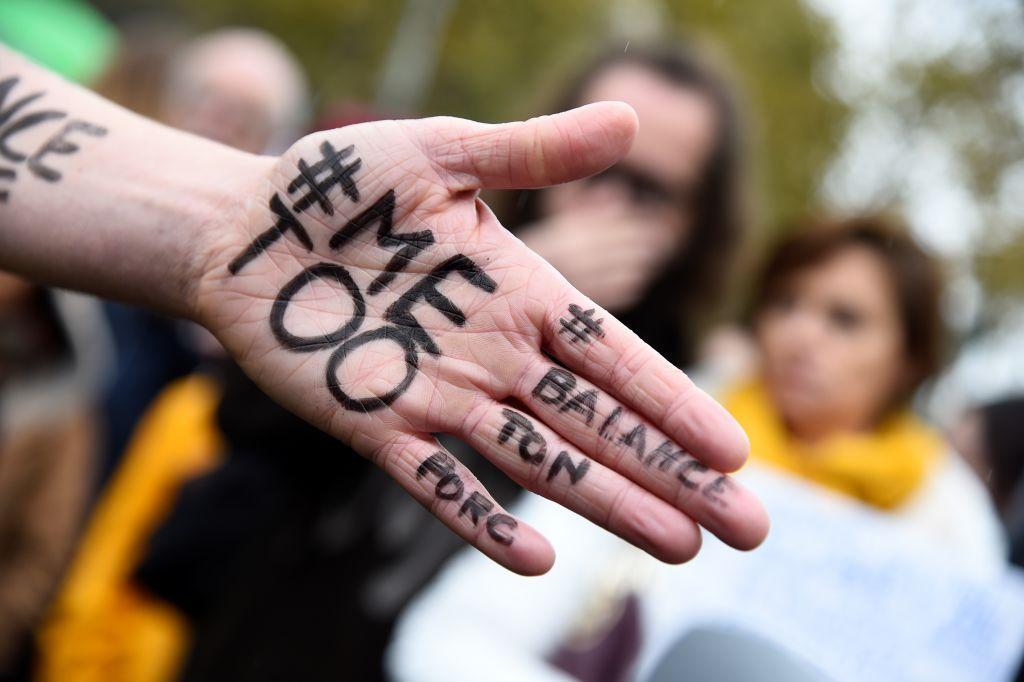
What #MeToo looks like around the world
Before it became a worldwide phenomenon in hashtag form, Tarana Burke used the phrase "me too" to help form a community around sexual assault victims. In 2006, Burke founded Just Be Inc., an organization dedicated to the health and well-being of young women of color, and coined the phrase after a girl revealed her experience with sexual assault.
In October of 2017, the New Yorker and New York Times each published stories about high-profile women, including actress Ashley Judd, and Italian actor and director Asia Argento, who said they had been sexually assaulted by Hollywood producer Harvey Weinstein. Later that month, actor Alyssa Milano sent the tweet heard around the world and #MeToo was born. It was tweeted almost a half a million times in 24 hours.
The #MeToo movement has gained steam over the past year, bringing down politicians, CEOs, and powerful men in Hollywood while launching a global conversation about sexual harassment. More women are speaking out about their experiences and some countries have subsequently introduced new legislation or changed their policies and laws around assault and rape.
To get the international scope of the #MeToo movement, Stacker combed through news archives and referenced timelines from outlets around the world. Click through to see how the hashtag has inspired global change.
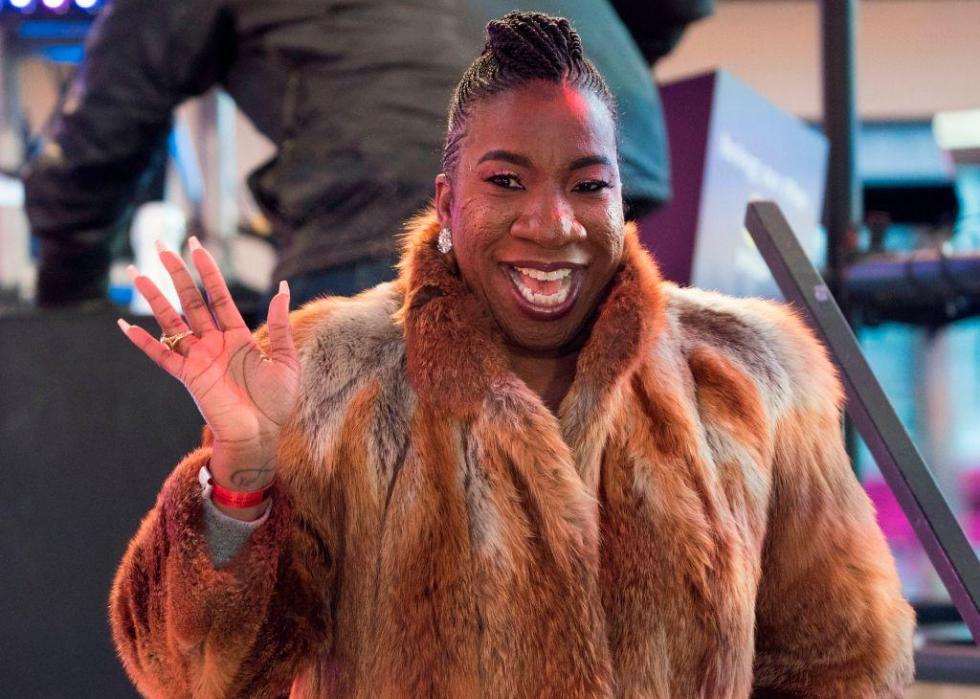
Tarana Burke
Activist Tarana Burke referenced the phrase “me too” in 2006 in an effort to help give a voice to underprivileged women of color who were victims of sexual abuse.
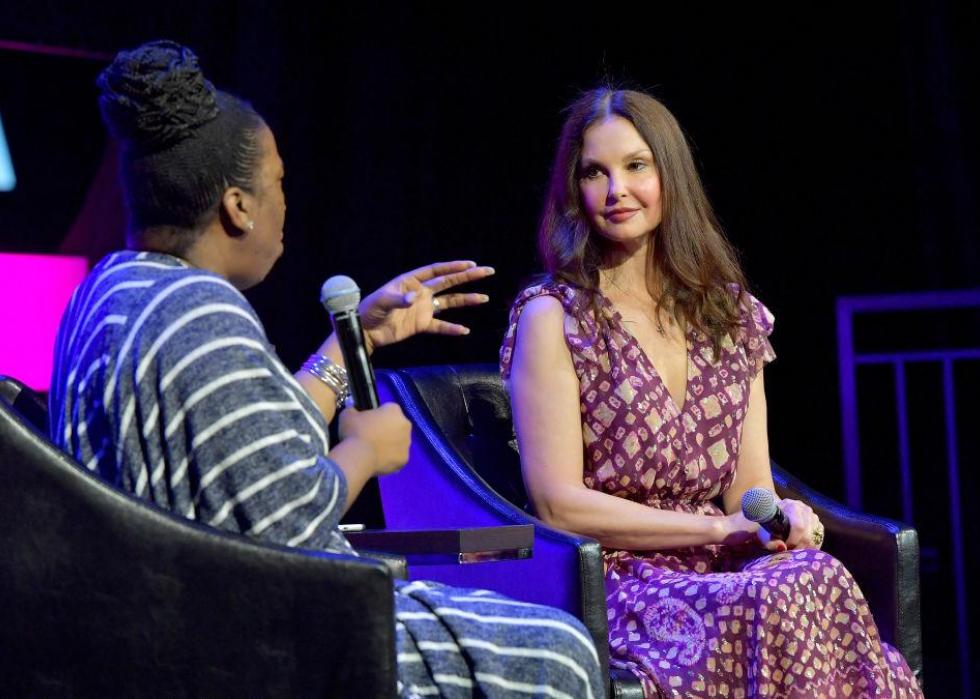
Ashley Judd
Tarana Burke, left, and Ashley Judd spoke onstage at “Time’s Up” on April 28, 2018, during the Tribeca Film Festival in New York. On Oct. 5, 2017, The New York Times ran a piece detailing Judd’s account of the sexual harassment she endured from Hollywood producer Harvey Weinstein. In May, Judd filed a lawsuit suing the media mogul for harming her career because she shunned his sexual advances.
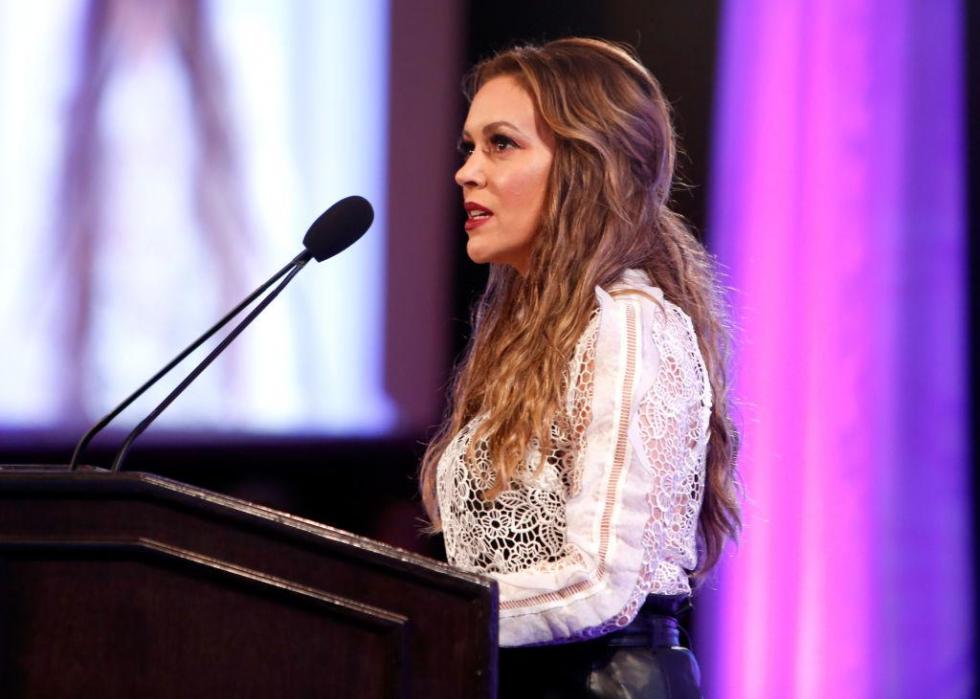
Alyssa Milano
A little over a week after the New York Times story was published, Alyssa Milano tweeted: “If you’ve been sexually harassed or assaulted, write ‘me too’ to this tweet.”
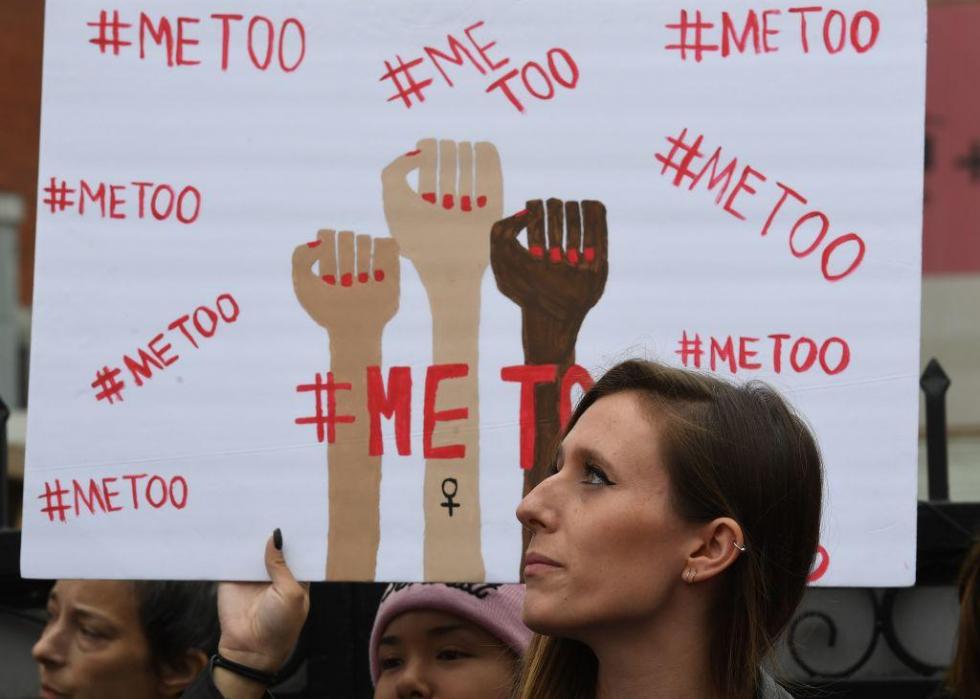
#MeToo goes viral
Victims of sexual violence and their supporters protested during a #MeToo march in Hollywood, California on Nov. 12, 2017. A day after Alyssa Milano tweeted about sexual assault, nearly half a million people joined her in sharing the hashtag #MeToo.
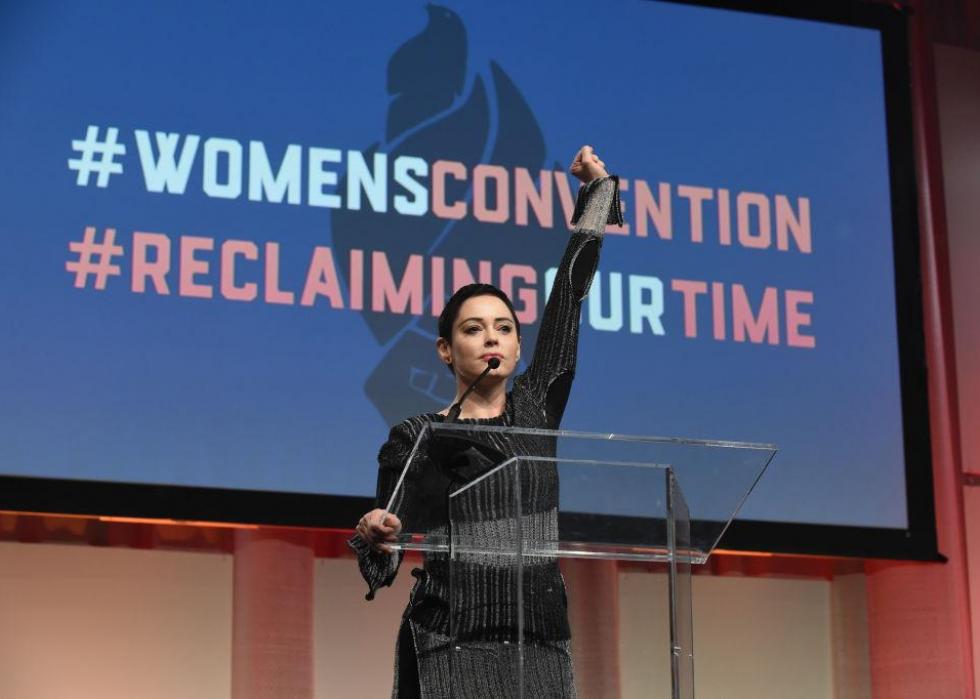
Rose McGowan
Actress Rose McGowan spoke at The Women’s Convention in Detroit on Oct. 27, 2017. McGowan accused Harvey Weinstein of rape shortly after Ashley Judd’s story went public. After making the accusation, she tweeted #MeToo.
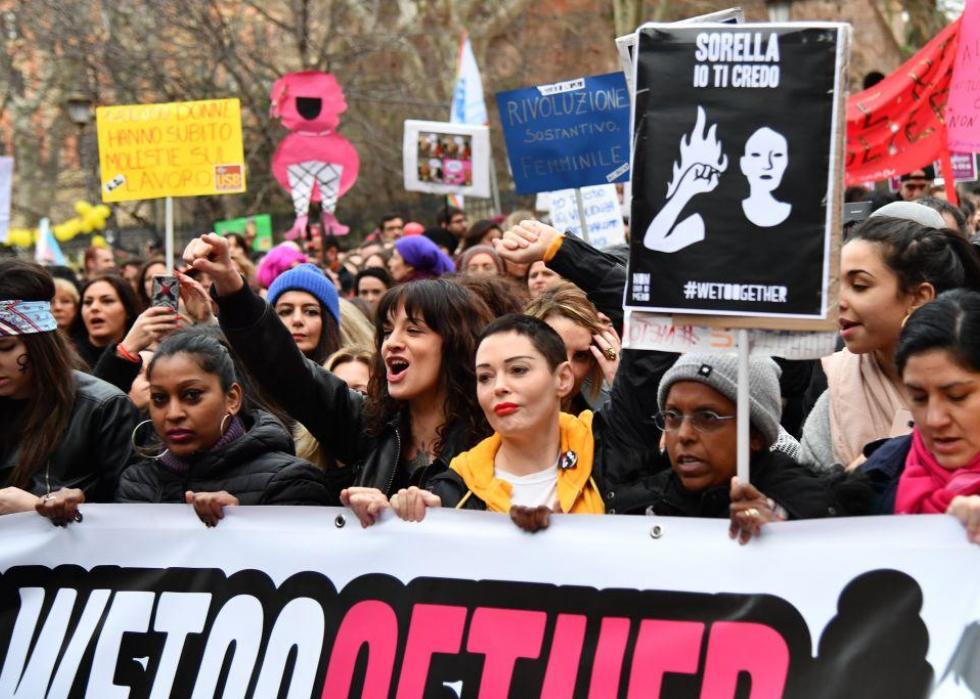
Asia Argento
Italian actor and director Asia Argento, center, who accused Harvey Weinstein of sexual assault, marched with Rose McGowan, in the “Non Una Di Meno”—Not One (Woman) Less—movement on March 8, 2018, as part of International Women's Day in Rome.
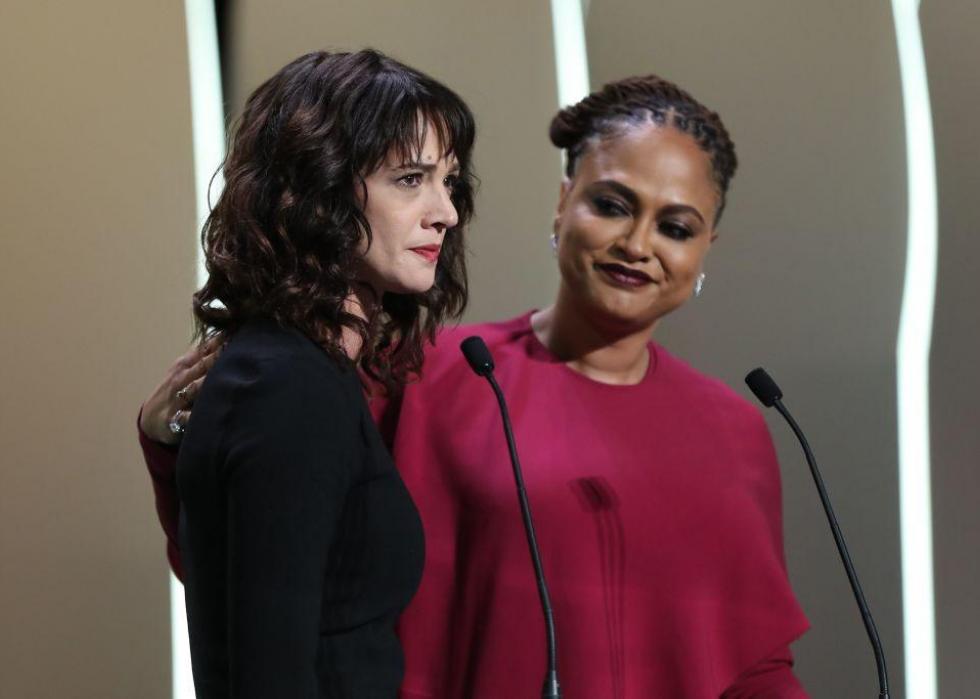
#quellavoltache
Asia Argento, who previously tweeted #quellavoltache, spoke out about sexual harassment and Harvey Weinstein alongside director and screenwriter Ava Duvernay at the Cannes Film Festival in France on May 19, 2018. Quella volta che was Italy’s call to men and women to speak out about their sexual abuse experiences.
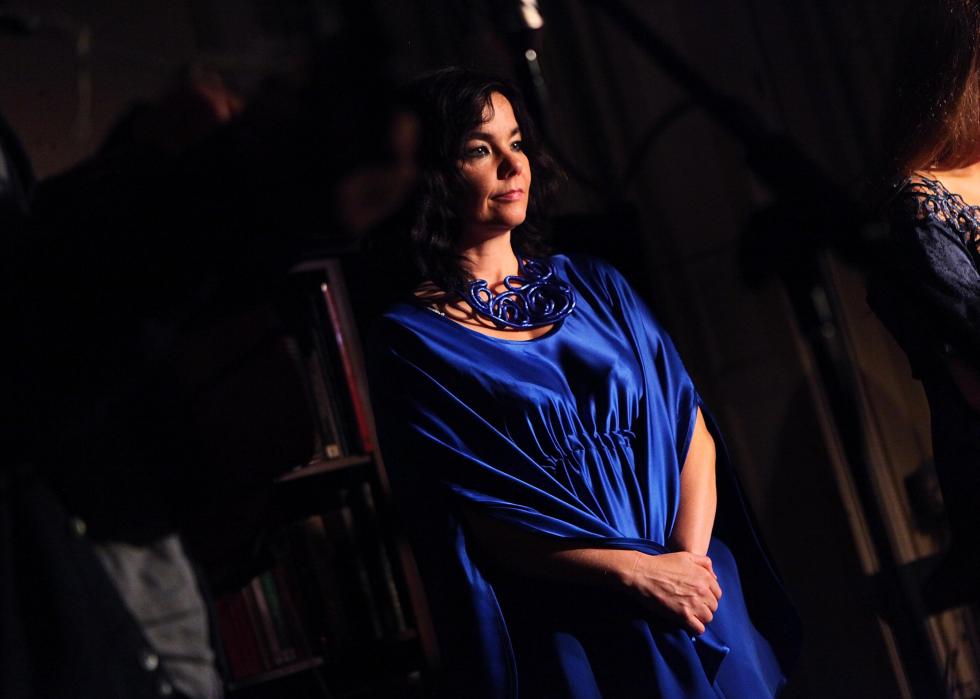
Bjork
On Oct. 15, 2017, Icelandic pop singer Bjork posted on Facebook that she was sexually harassed by a Danish director. Lars Von Trier admitted he hugged the actress on the set of “Dancer in the Dark,” but he denies allegations of sexual harassment.
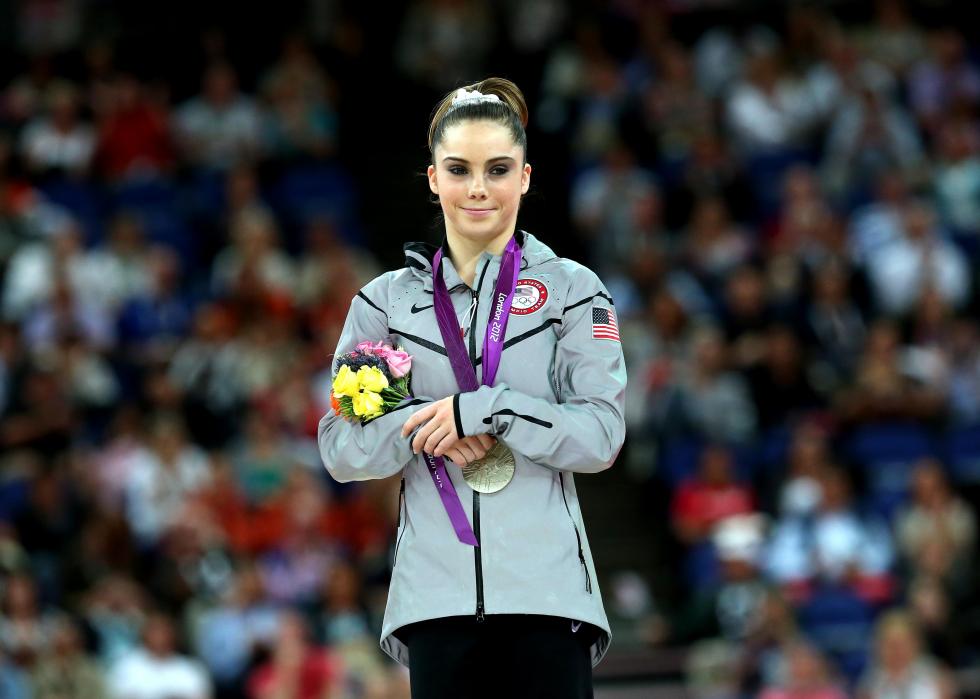
McKayla Maroney
Olympic gymnast McKayla Maroney, pictured at the 2012 Olympics in London, joined the #MeToo movement on Oct. 18, 2017. Maroney accused Dr. Larry Nasser of molesting her from the age of 13. Earlier this year, Nasser was convicted of sexual abuse and sentenced to 40 to 175 years in prison after more than 160 girls and women came forward.
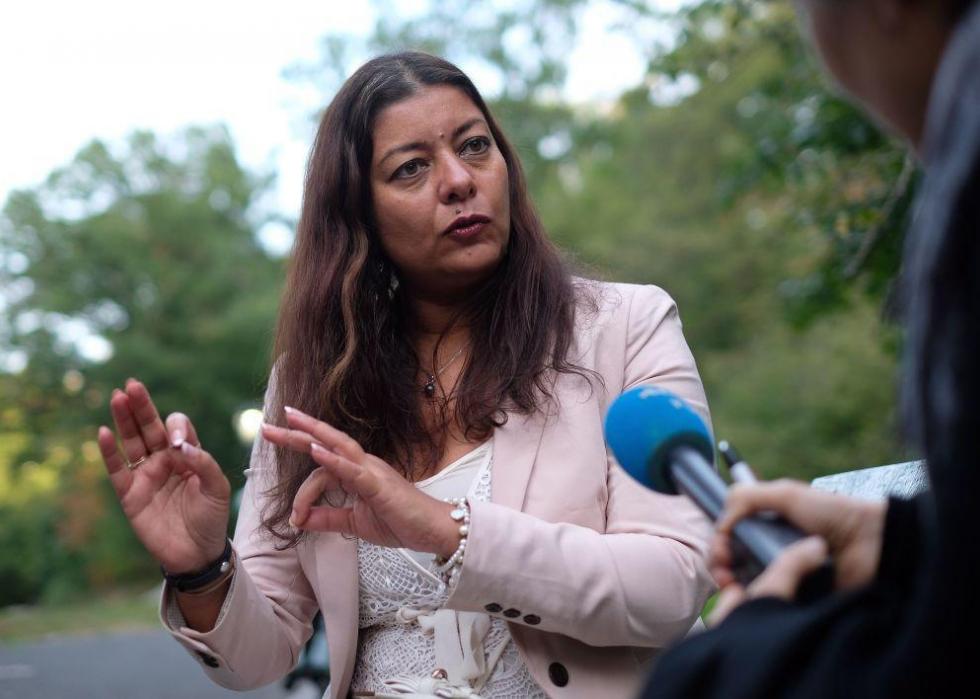
Sandra Muller
French journalist Sandra Muller spoke during an interview with Agence France-Presse on Oct.16, 2017 in New York. Muller created the hashtag #balancetonporc (rat out your pig), the French equivalent of #MeToo, to recount how her former boss had called her “my type of woman” and then commented on her breasts.
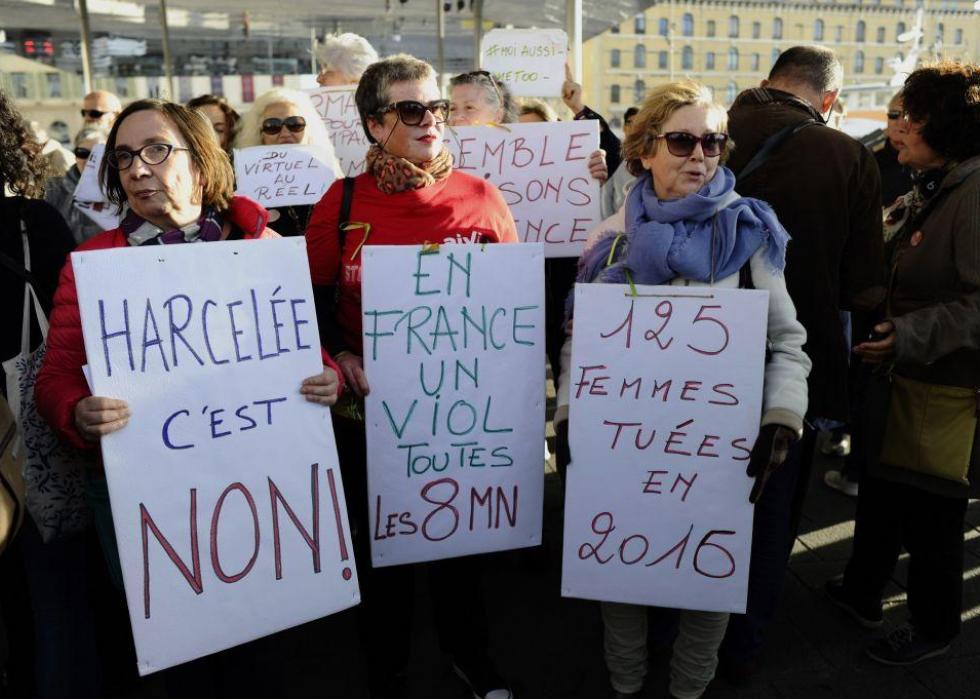
#balancetonporc
Women held placards reading “Harassment means no” and “In France, a rape every eight minutes” as people gathered at the Old Port of Marseille in southern France, on Oct. 29, 2017. Hundreds gathered to denounce harassment, sexual assault, and rape after women started sharing their stories under the hashtags #balancetonporc and #metoo.
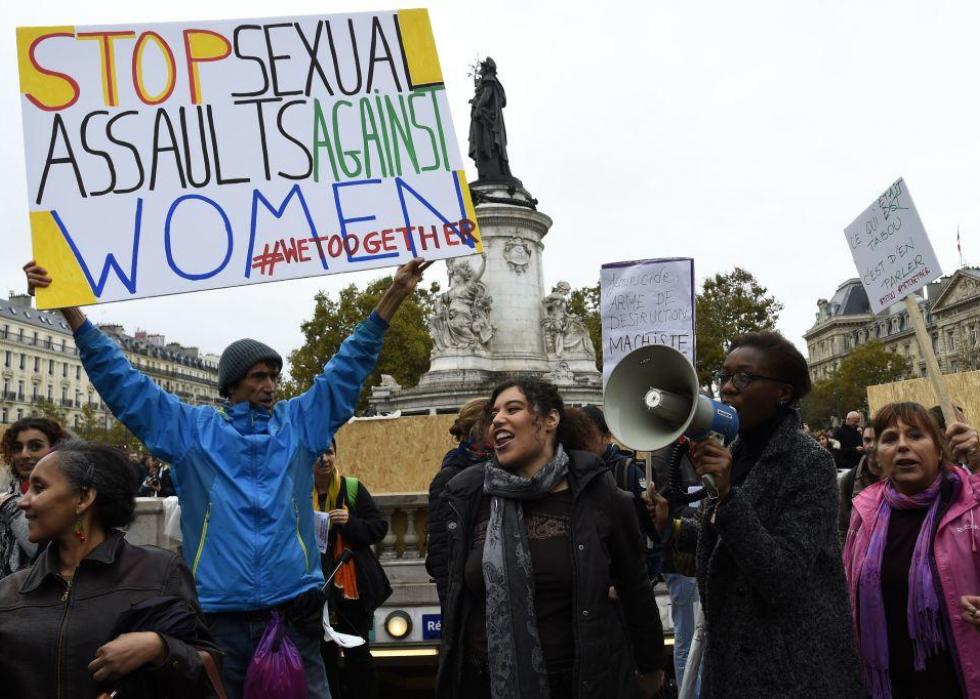
French protests
French activist Jean-Baptiste Redde held a placard as protesters took part in a gathering against gender-based and sexual violence called by the Effronté-e-s Collective, on the Place de la République square in Paris on Oct. 29, 2017, after the #MeToo movement spread to France.
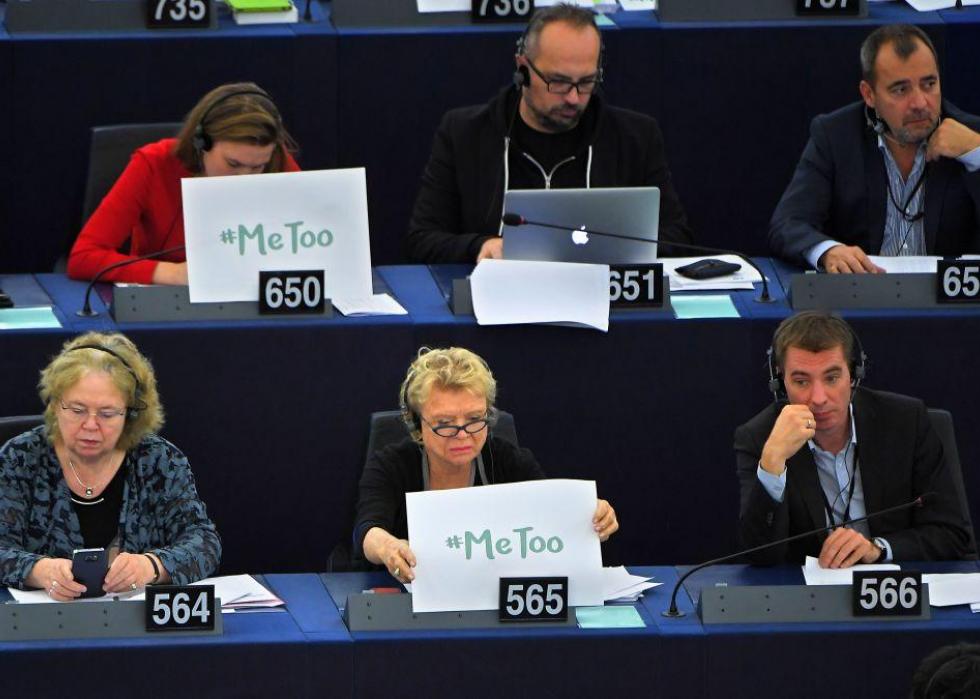
European Parliament
Eva Joly, front center, a French member of the European Parliament, held up a placard reading “#MeToo” during a debate about sexual harassment and abuse on the third day of the European Parliament's plenary session in Strasbourg, France, on Oct. 25, 2017.
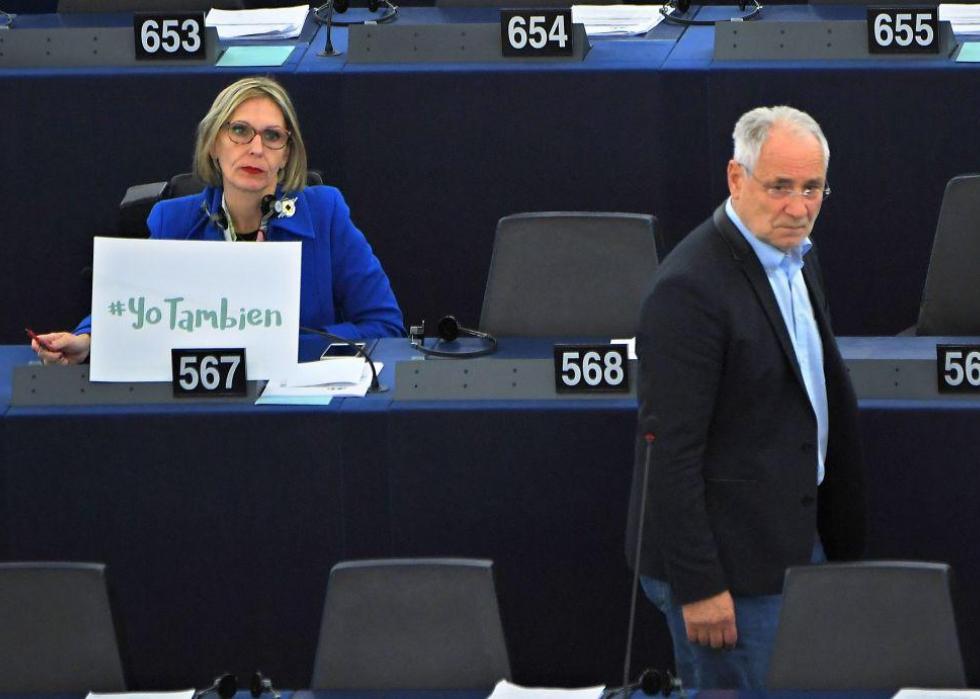
#yotambien
Spanish MEP Beatriz Becerra Basterrechea, left, showed her support of the movement with a #YoTambien (#metoo) sign during the sexual harassment and abuse debate at the European Parliament in Strasbourg, France, on Oct. 25, 2017.
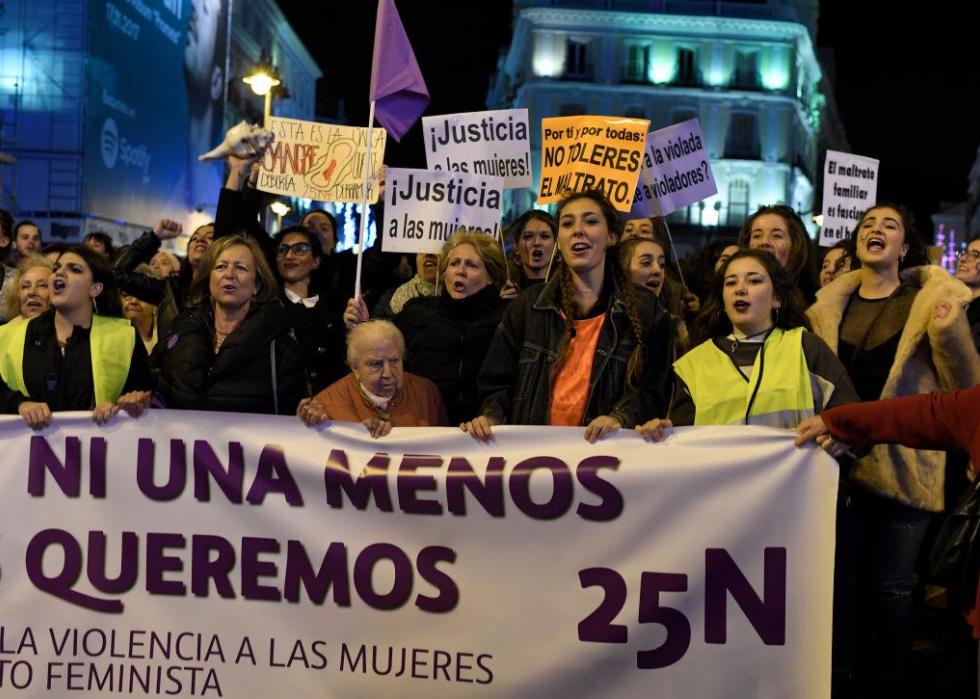
Women march in Madrid
Women held placards reading “Justice for women” during a demonstration to mark the International Day for the Elimination of Violence Against Women on Nov. 25, 2017, at the Puerta del Sol square in Madrid.
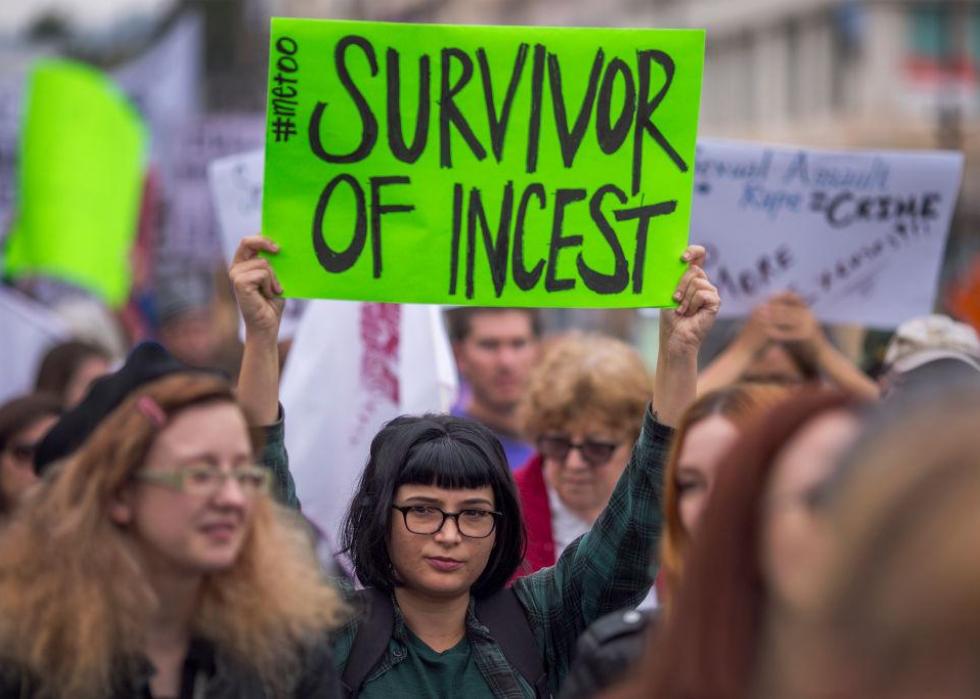
#MeToo Survivors' March
Demonstrators participated in the #MeToo Survivors’ March organized by Tarana Burke outside the CNN building on Nov. 12, 2017, in Los Angeles.
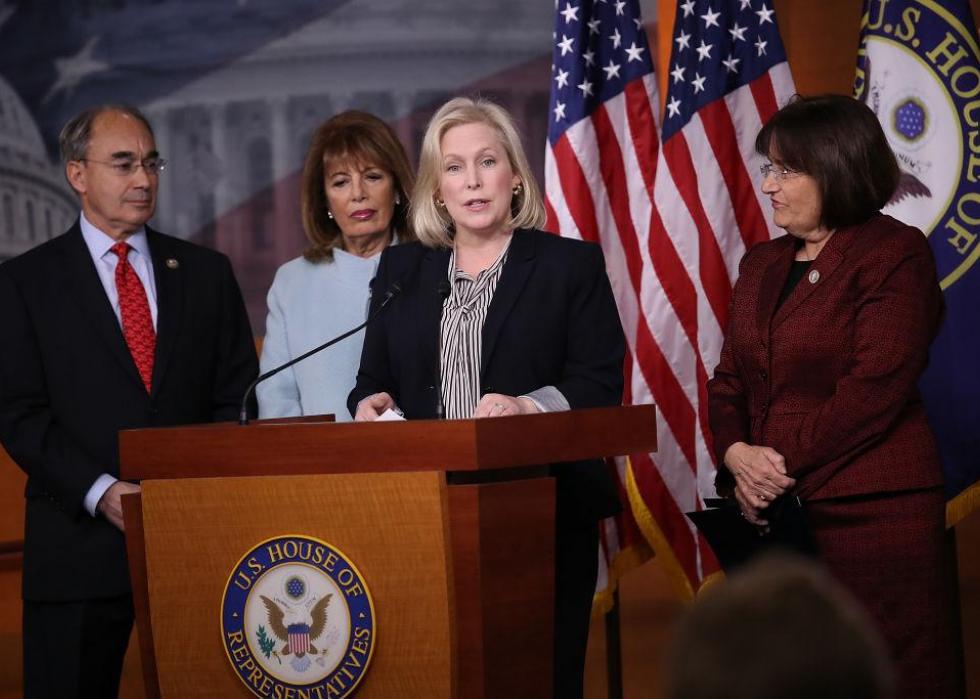
Kirsten Gillibrand
Senator Kirsten Gillibrand, center, spoke at a press conference on sexual harassment in Congress on Nov. 15, 2017, in Washington, D.C. Gillibrand and Rep. Jackie Speier, second from left, introduced bipartisan legislation to prevent and respond to sexual harassment in Congress. In May, Gillibrand urged the Senate to act on the legislation.
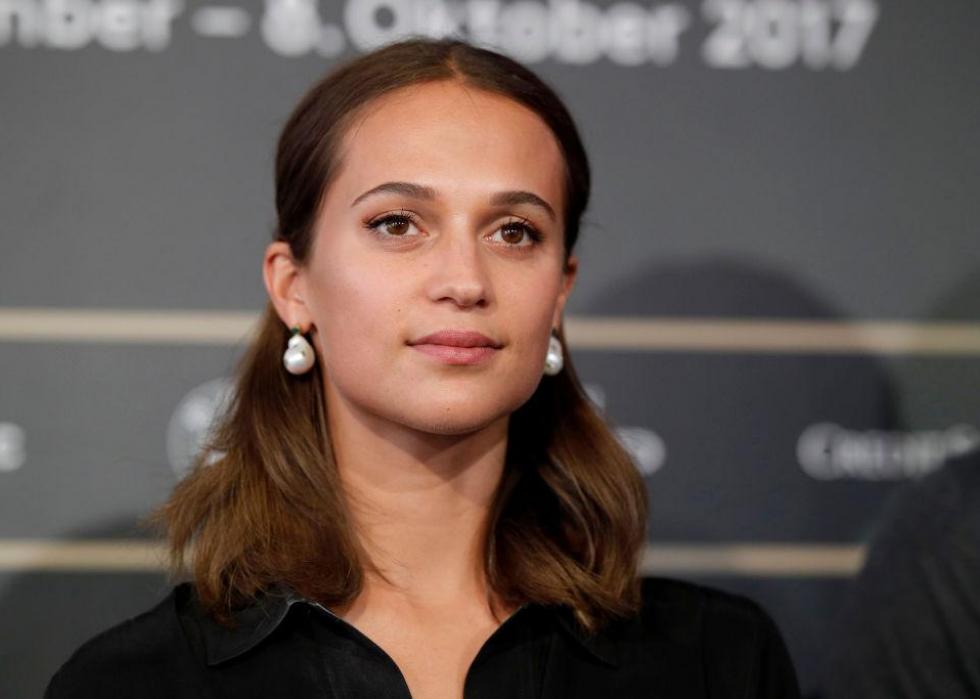
Alicia Vikander
Oscar-winner Alicia Vikander was among nearly 600 Swedish actresses who signed an open letter in November of 2017 that called upon the Swedish film and theater industry to do more to protect women from sexual abuse.
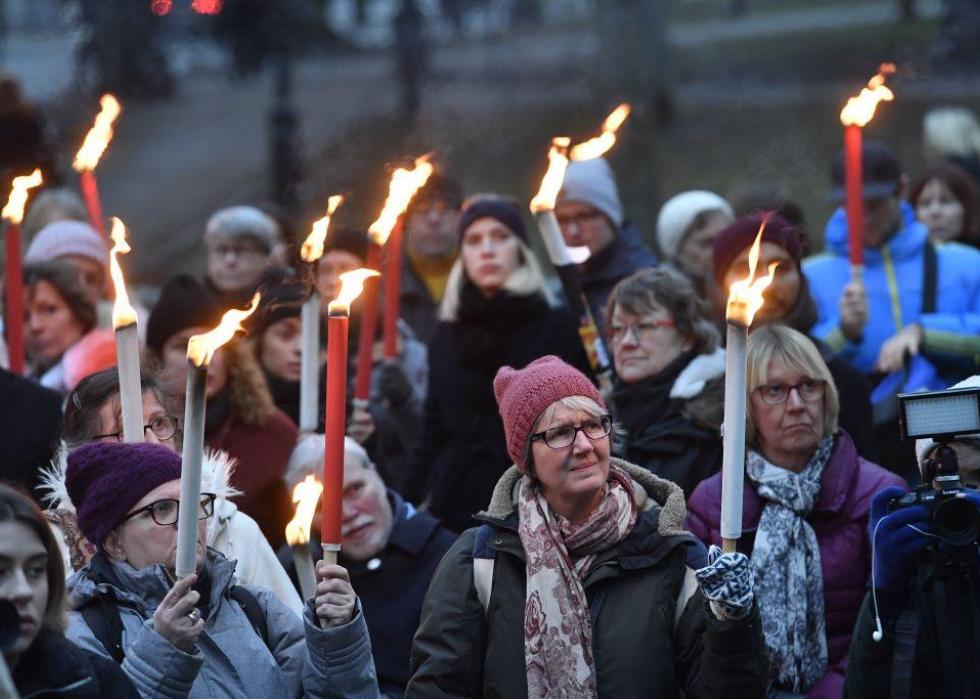
Rally in Stockholm
People held torches during a rally in support of #MeToo and for all victims of sexual offenses in Stockholm, Sweden on Jan. 14, 2018. Protests were organized in towns and cities throughout Sweden.
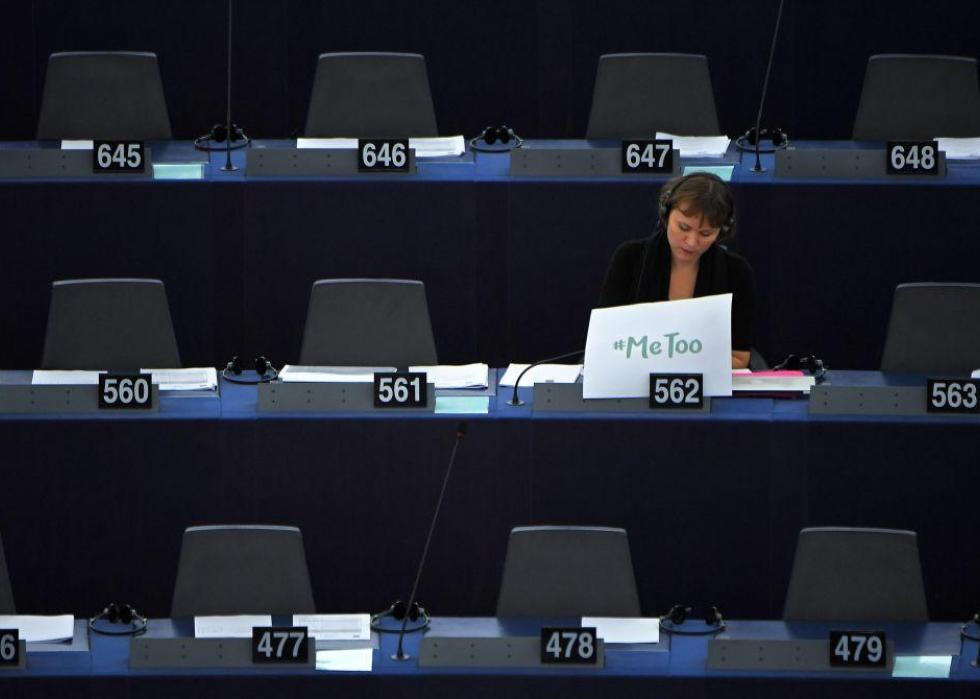
Sweden changes rape law
Swedish MEP Linnea Engstrom supported the #MeToo movement at the European Parliament meeting on sexual assault in France on Oct. 25, 2017. The Swedish Parliament proposed legislation in December of 2017 that would require explicit consent for sexual contact. The law passed on May 23 and went into effect on July 1. The new law states thaxt a person “who, with a person who is not participating freely, has sexual intercourse” is guilty of rape.
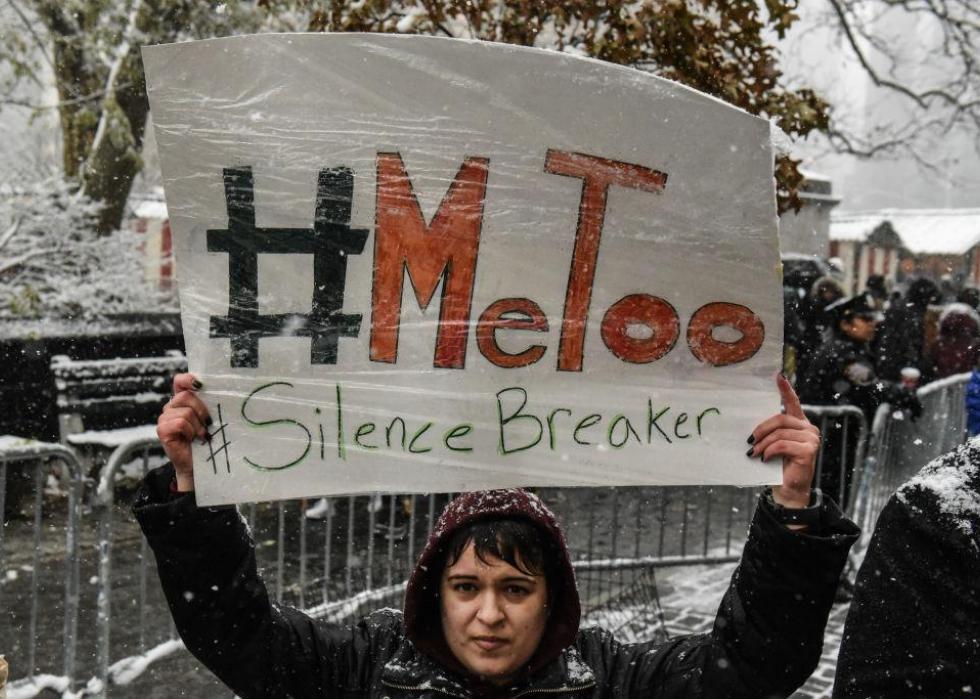
The Silence Breakers
A woman marched at the #MeToo rally outside of the Trump International Hotel on Dec. 9, 2017, in New York. Time magazine named The Silence Breakers as Person of the Year in December of 2017. They cited those in the #MeToo movement, along with others who have come forward with their sexual assault and harassment experiences.
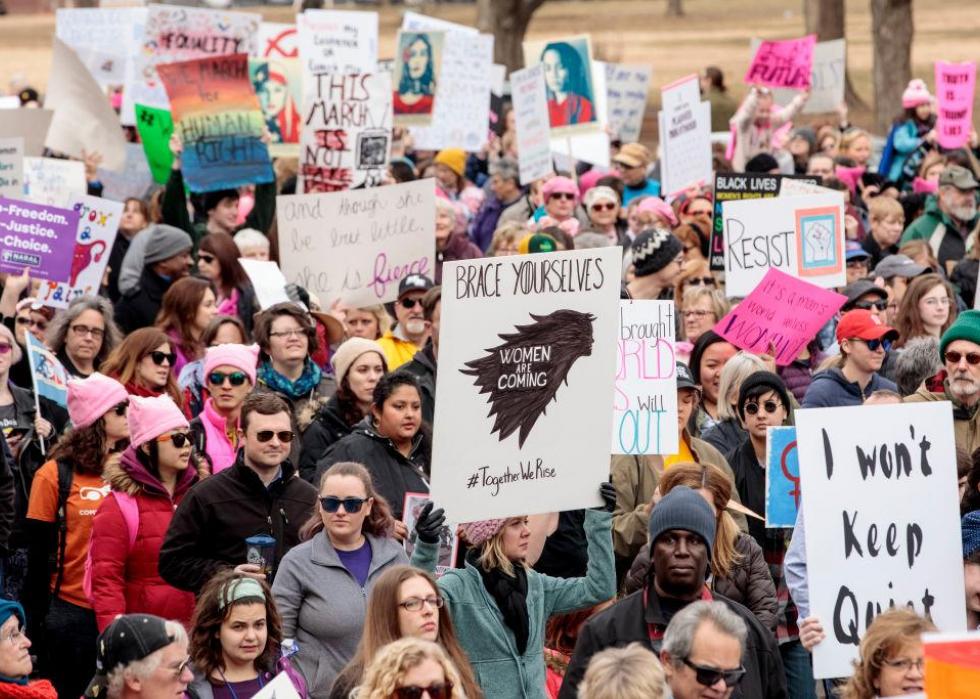
Women's March for Truth
Demonstrators participated in the Women's March for Truth on Jan. 20, 2018 in St Louis, Missouri. One year after women and their supporters rallied in the largest single-day demonstration in American history, demonstrators gathered again to raise awareness for women's issues.
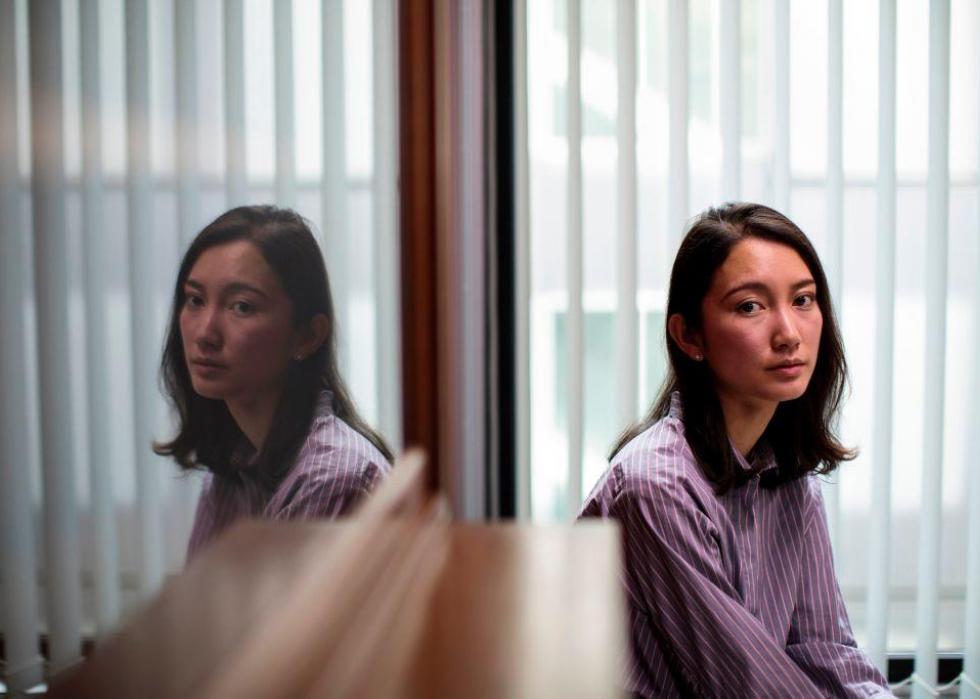
Shiori Ito
Journalist Shiori Ito broke taboos in Japan when she went public in 2017 with accusations that a television newsman raped her in 2015. Ito wrote in 2018 that the global #MeToo movement has provided an opening in Japanese media to discuss and raise awareness about sexual harassment and assault.
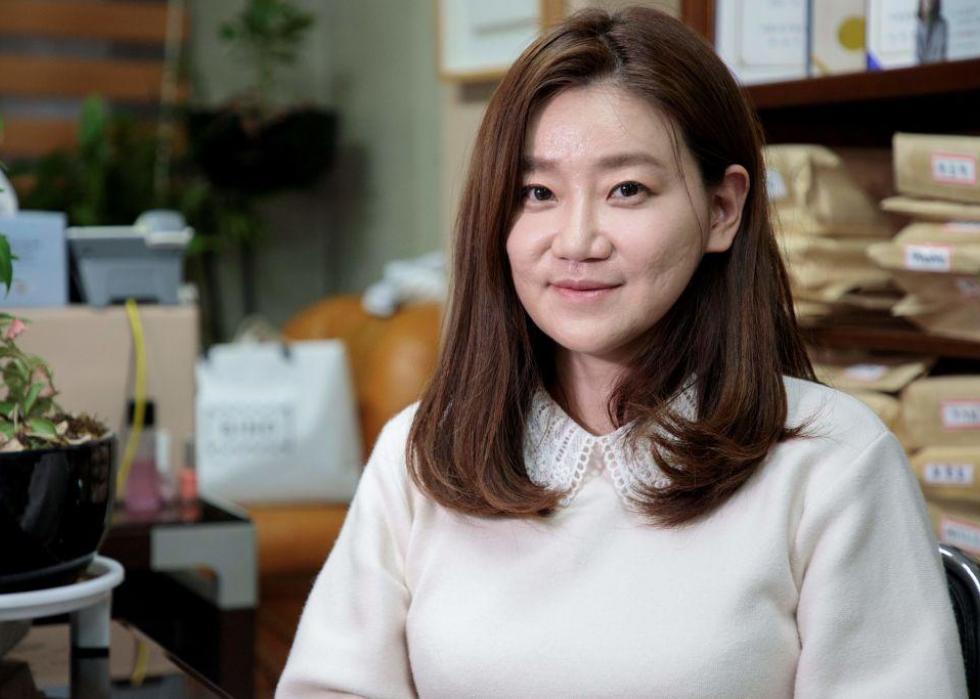
Lee Eun-eui
Former Samsung employee-turned-lawyer Lee Eun-eui is pictured in Seoul on March 15, 2018. She sued Samsung and won a harassment case against her boss before becoming a lawyer. Lee, who defends victims of sexual abuse, said she hopes the #MeToo movement will inspire more people to stand up for women who are victims of sexual harassment or abuse.
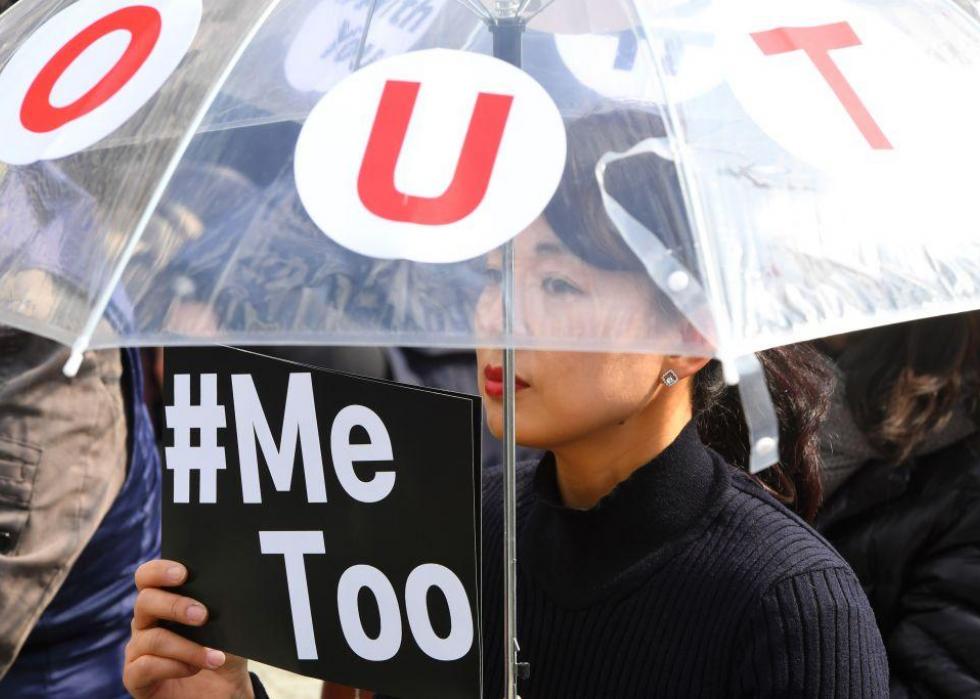
Rally in South Korea
A South Korean demonstrator held a small banner during a rally in Seoul to mark International Women's Day as part of the country's #MeToo movement on March 8, 2018. The #MeToo movement has gradually gained momentum in South Korea, which remains socially conservative and patriarchal in many respects.
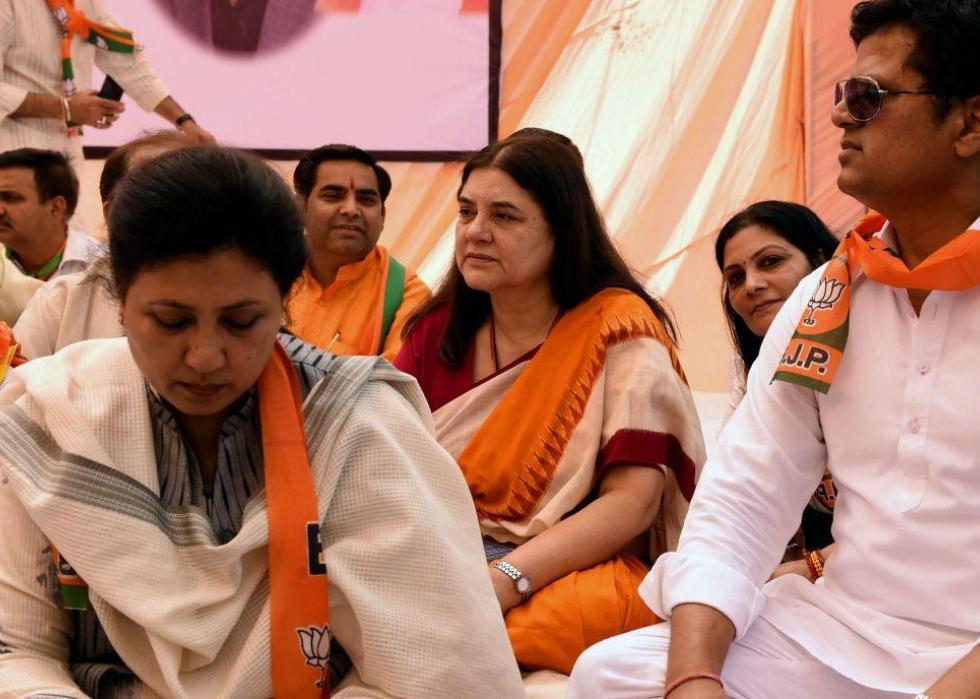
Maneka Gandhi
Maneka Gandhi, center, India’s minister for women and child development, participated in a fast in New Delhi on April 12, 2018. Gandhi wrote to 24 Bollywood film producers in 2017 demanding they adhere to India’s sexual harassment legislation passed in 2013. Gandhi also launched “SHe-box” (sexual harassment electronic box) as a way for people to register their harassment complaints online.
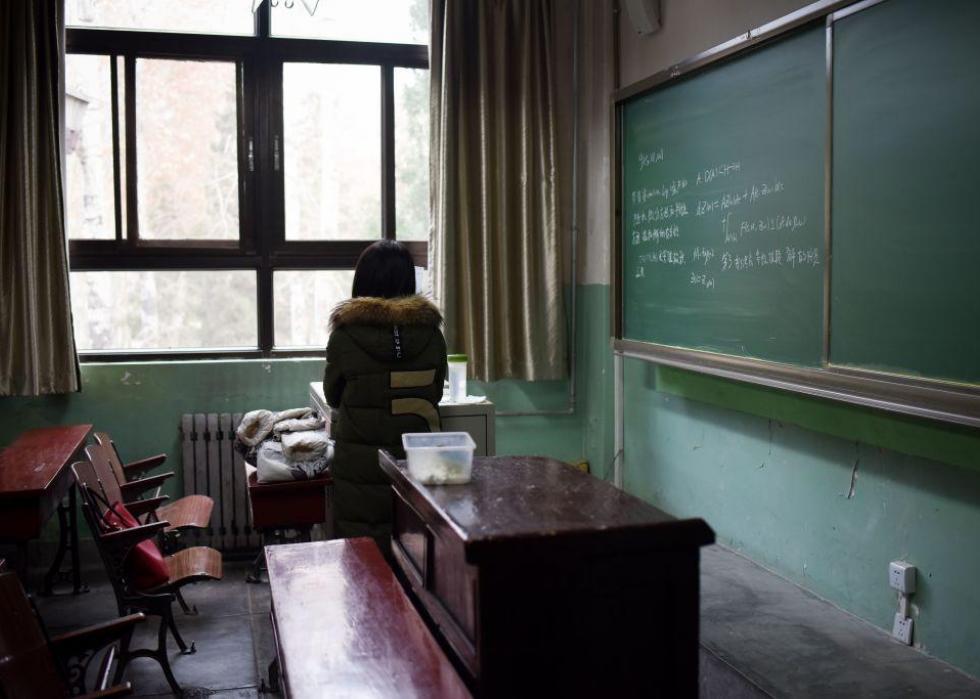
#MeToo in China
A female student is pictured on Jan. 17, 2018, in a classroom at Beihang University in Beijing. The university recently removed a professor from his position as vice-director of the graduate school after an investigation established he had sexually harassed multiple students. The hashtags #MeToo and #WoYeShi became trending topics on Weibo, with many more people speaking about their assaults in the forums, including exposing assault at universities.
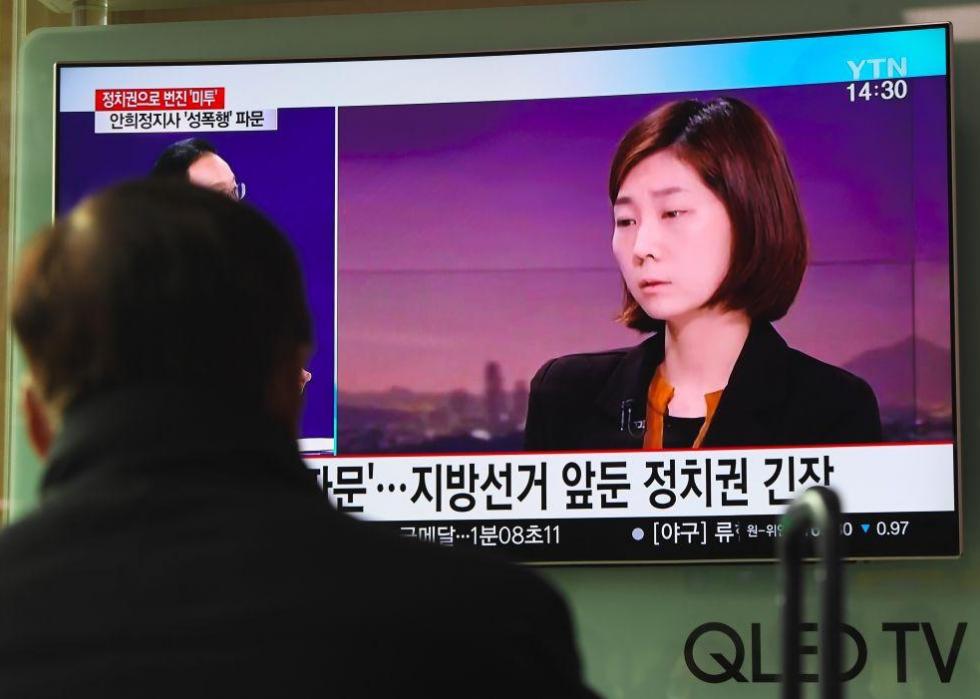
Kim Ji-eun
A news report showed Kim Ji-eun, a secretary of Ahn Hee-jung, at a railway station in Seoul on March 6, 2018. Ahn, the former South Korean presidential contender of the ruling Democratic Party stepped down and announced his retirement from politics after Kim accused him of multiple rapes. She said she was encouraged to speak up because of the #MeToo movement.
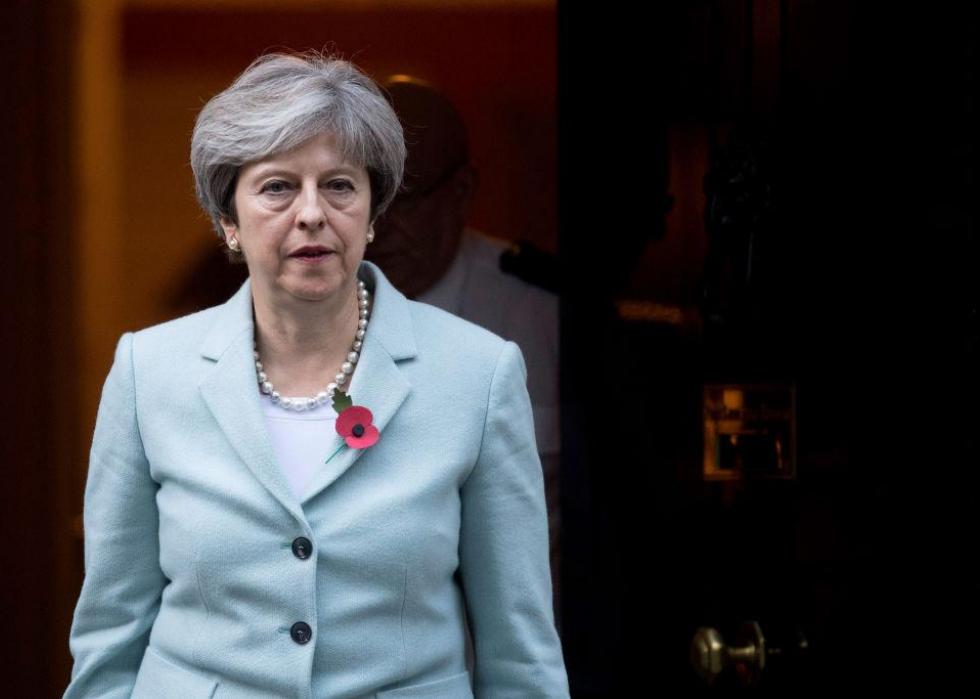
Theresa May
British Prime Minister Theresa May told Damian Green, Britain’s First Secretary of State, to resign after he was untruthful about pornography found on an office computer. Following multiple allegations of sexual harassment in the Houses of Parliament, May said the disciplinary regime “lacked teeth” and needed strengthening.
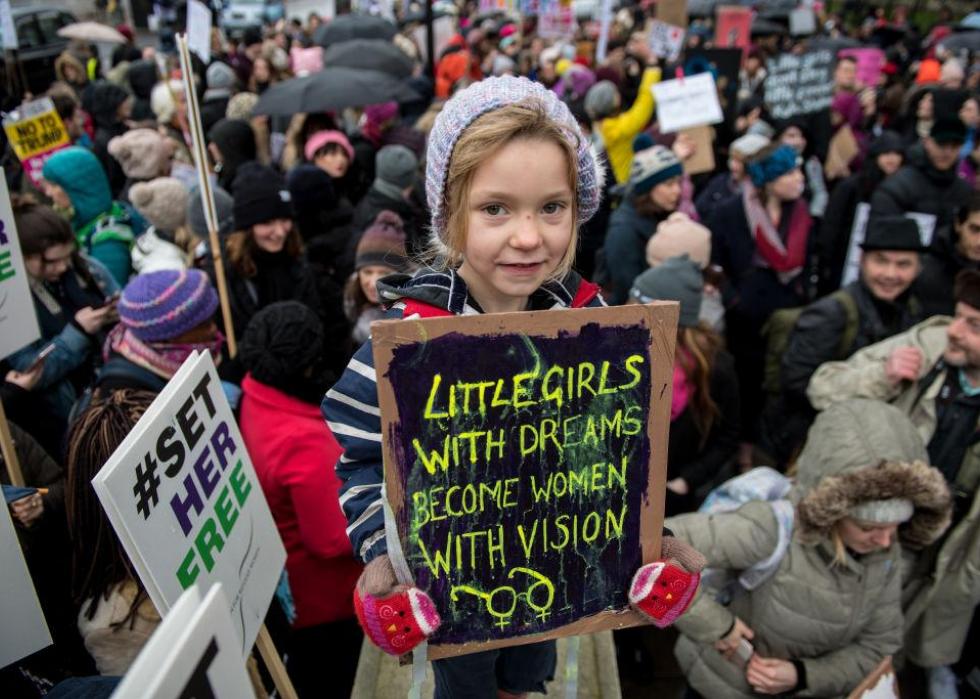
Women's march in London
Orla Dean, 5, held a placard during the Time's Up rally at Richmond Terrace, opposite Downing Street, on Jan. 21, 2018 in London. The Time's Up Women's March marks the one-year anniversary of the first Women's March in London.
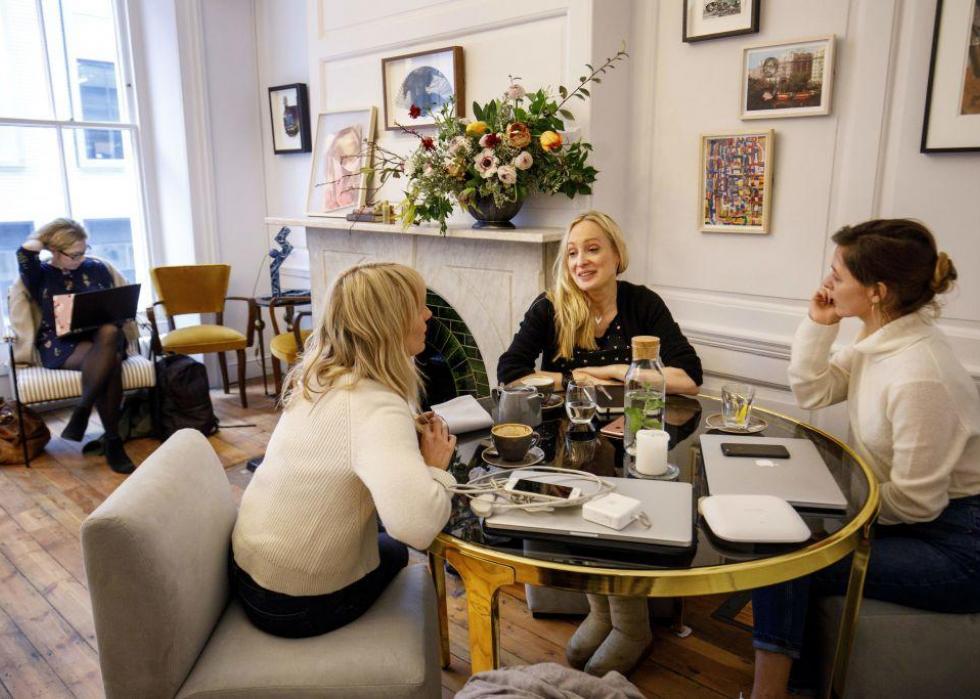
Britain's women-only club
Members use the facilities at London's first women-only private club, The AllBright, in central London on Feb. 28, 2018. A refuge for gentlemen over centuries, women are now having their turn to enjoy private members clubs—effectively harnessing a British tradition of female activism renewed by the #MeToo movement.
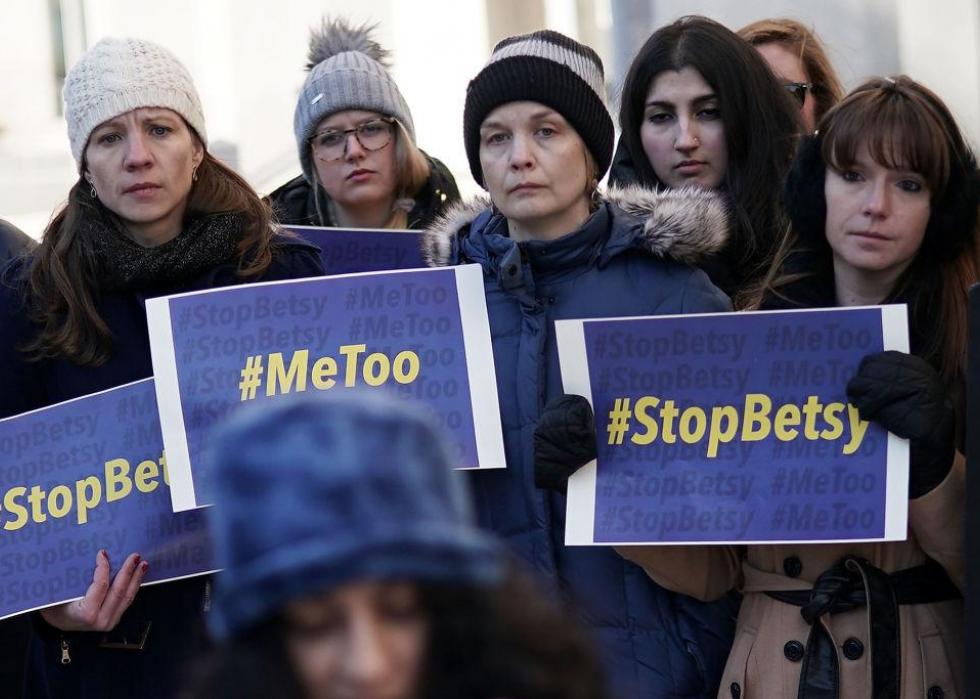
Title IX lawsuit
Activists held signs outside the Department of Education on Jan. 25, 2018, in Washington, D.C. Advocates filed a lawsuit seeking to overturn the Trump administration’s decision to roll back Title IX guidelines on how to respond to students who experience sexual violence and harassment.
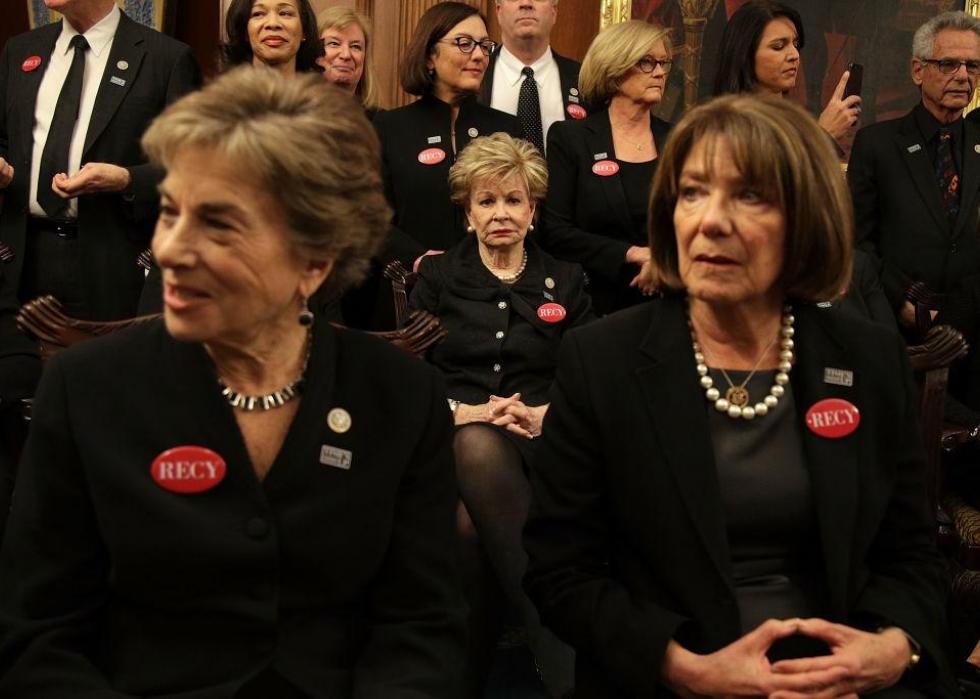
House Democrats wear black
From left, U.S. Rep. Jan Schakowsky, Rep. Madeleine Bordallo, Rep. Susan Davis, and other House Democrats wore black prior to President Donald Trump's first State of the Union address on Jan. 30, 2018 in Washington, D.C. in support the #MeToo movement and Times Up initiative.
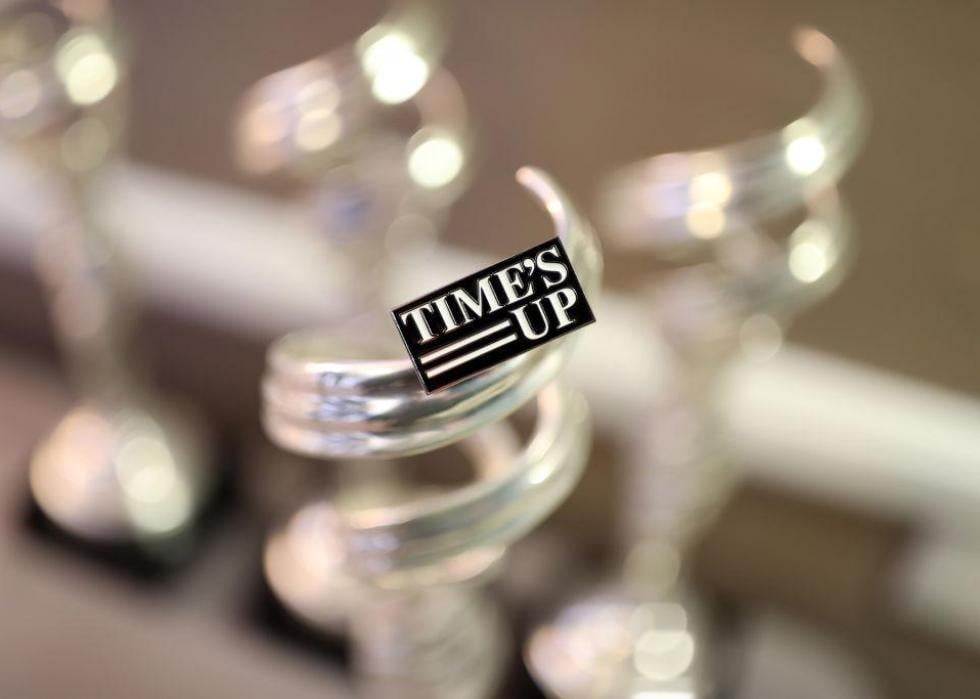
Time's Up
Hollywood actresses announced Time’s Up at the beginning of 2018. Actresses America Ferrera, Eva Longoria, Reese Witherspoon, and producer Shonda Rhimes joined with 300 others in the entertainment industry to create the initiative to address systemic sexual harassment in Hollywood and workplaces across the country.
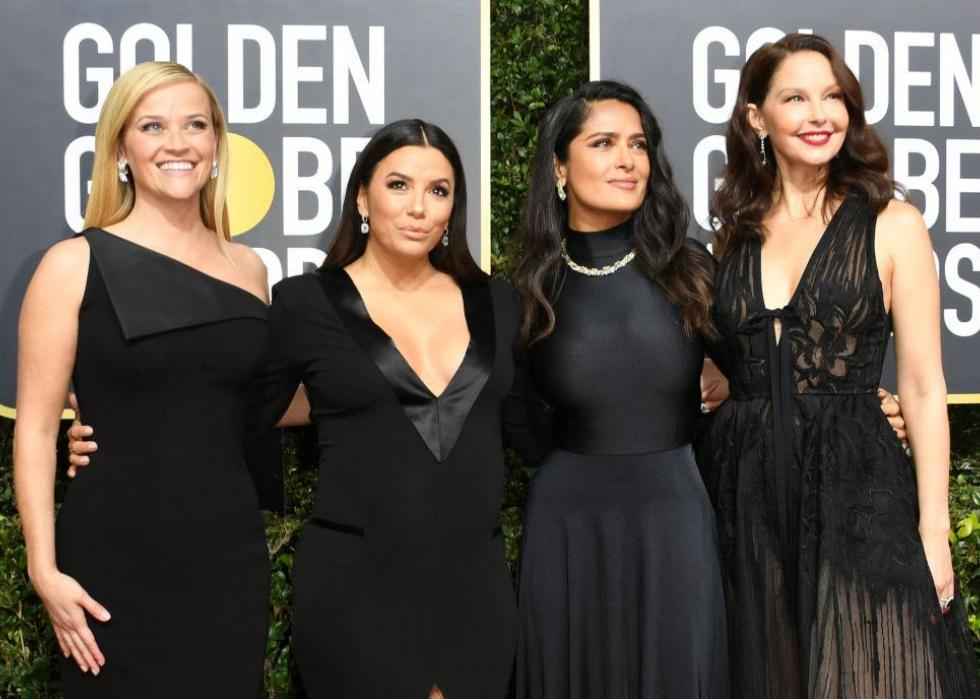
Golden Globes in Black
From left, Reese Witherspoon, Eva Longoria, Salma Hayek, and Ashley Judd posed at the 75th Annual Golden Globe Awards on Jan. 7, 2018, in Beverly Hills, California. Women wore black to the awards ceremony to protest sexual harassment and raise awareness for Time's Up.
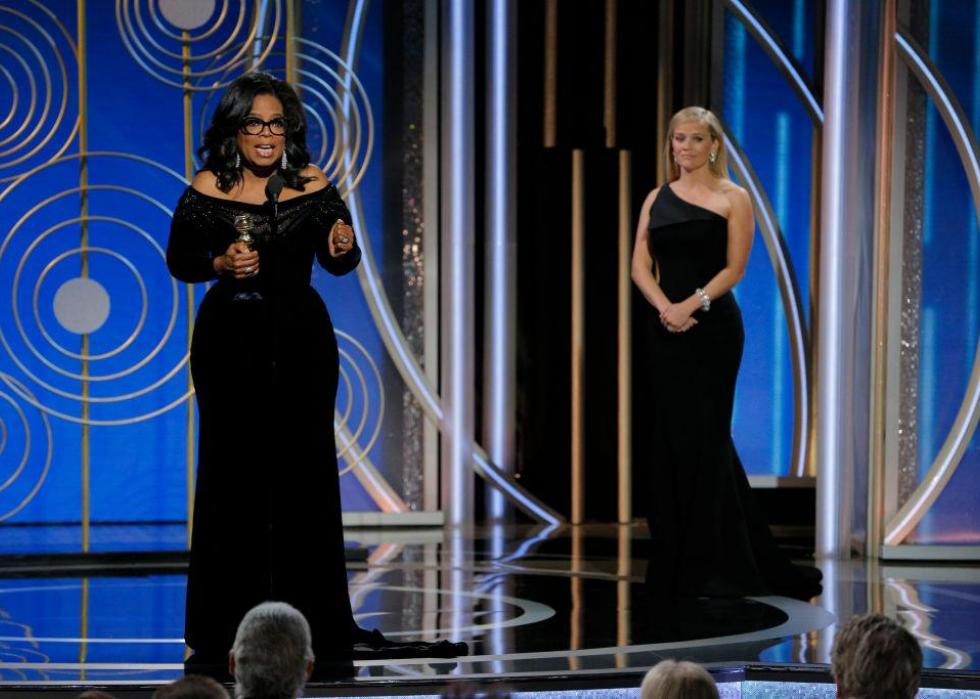
Oprah Winfrey
Oprah Winfrey accepted the 2018 Cecil B. DeMille Award—as the first black woman to receive the award—during the 75th Annual Golden Globe Awards. In her widely viewed speech, Winfrey addressed racism and sexism saying women had spent “too many years in a culture broken by brutally powerful men.” She added, “For too long, women have not been heard or believed if they dared to speak their truth to the power of those men. But their time is up.”
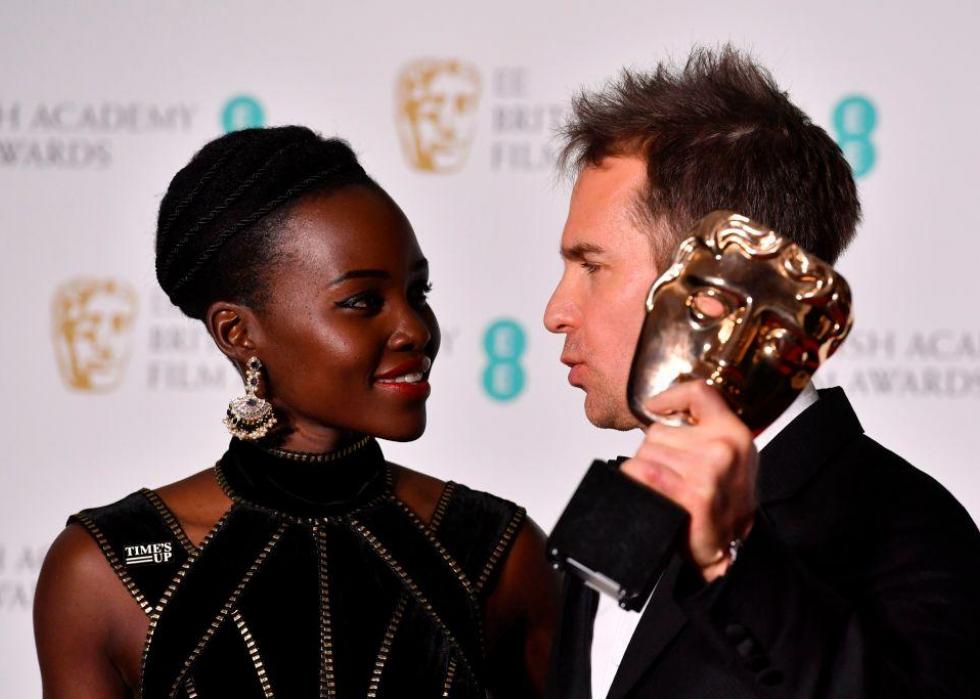
Lupita Nyong'o
Actress Lupita Nyong'o wore a Time’s Up pin alongside actor Sam Rockwell at the British Academy of Film and Television Arts in London on Feb. 18, 2018. The Mexican-born Kenyan actress wrote about being sexually harassed by Harvey Weinstein.
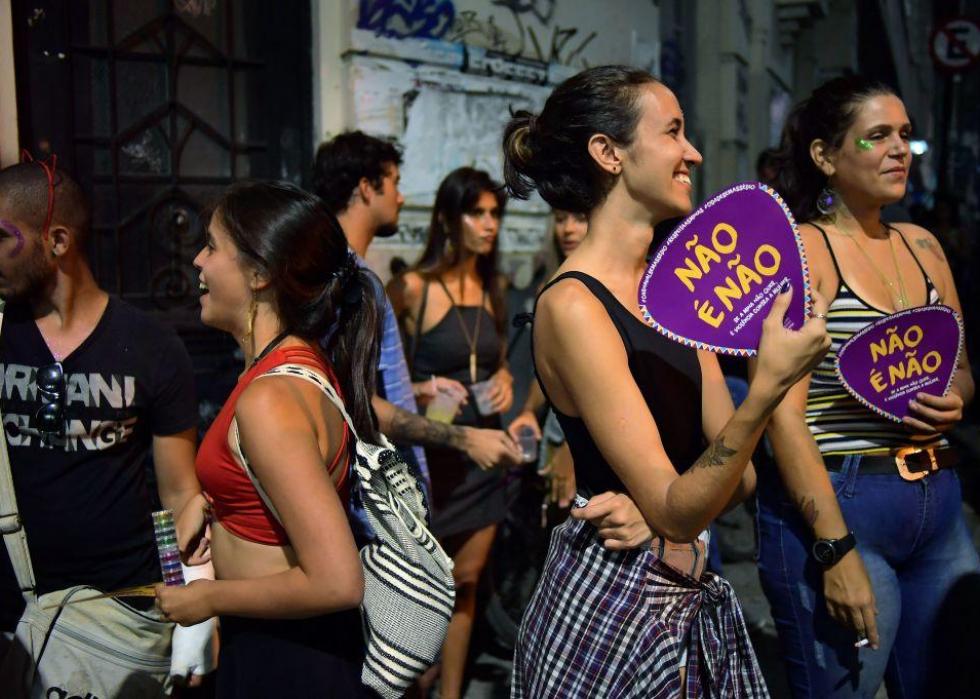
"No means No" in Brazil
Women held fans that read “Nao e Nao” or “No means No” during Carnival season in Rio de Janeiro on Feb. 7, 2018. Brazilian activists distributed temporary tattoos and visual slogans to raise awareness about sexual harassment during Carnival.
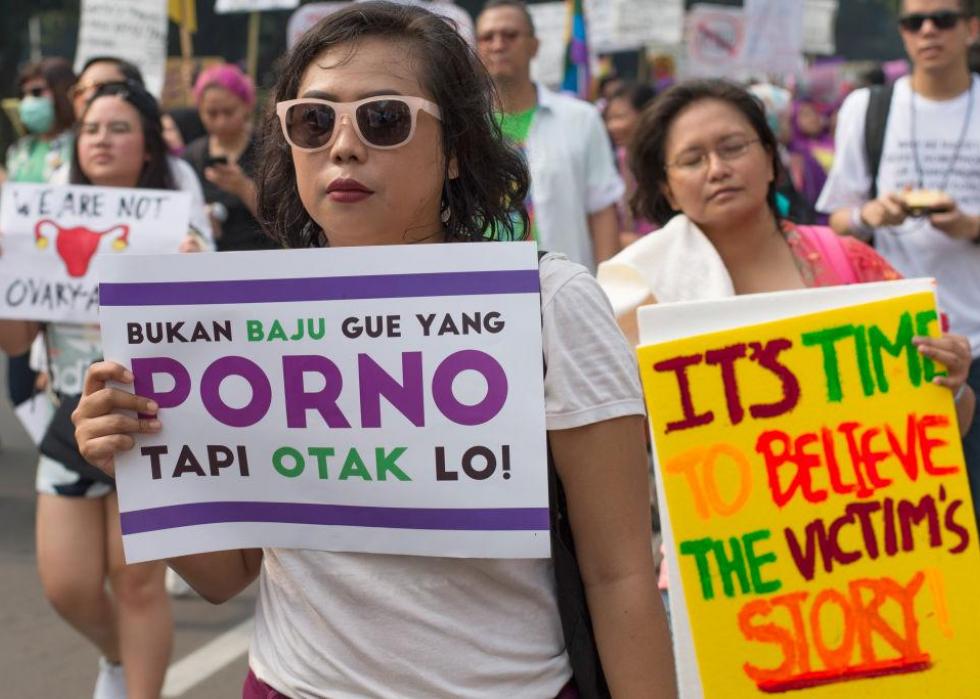
Women's March in Indonesia
People took part in the Women's March rally in Jakarta, Indonesia on March 3, 2018. The participants were demonstrating for equal rights and an end to violence against women. In January of 2018, an Indonesian woman went public with a CCTV video of a man groping her in public after she said police officers did not take her complaints seriously. The video went viral and the suspect was arrested.
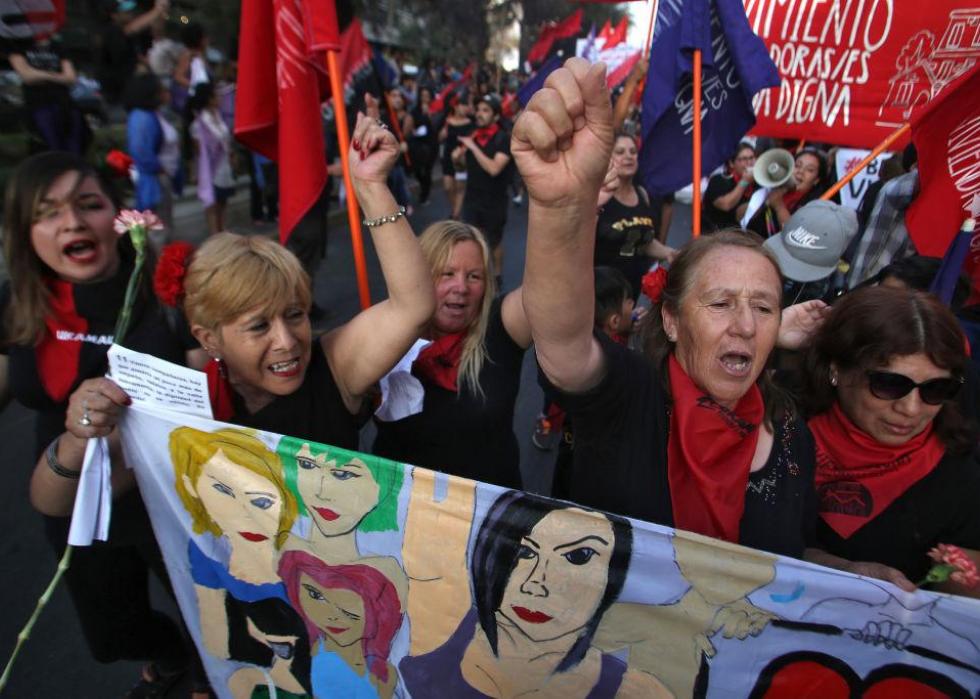
International Women's Day in Chile
Women marched on International Women's Day in Santiago, Chile, on March 8, 2018. In 2017, Chile ended its blanket ban on abortion, but the government issued rules earlier this year that could impede access to legal abortion.
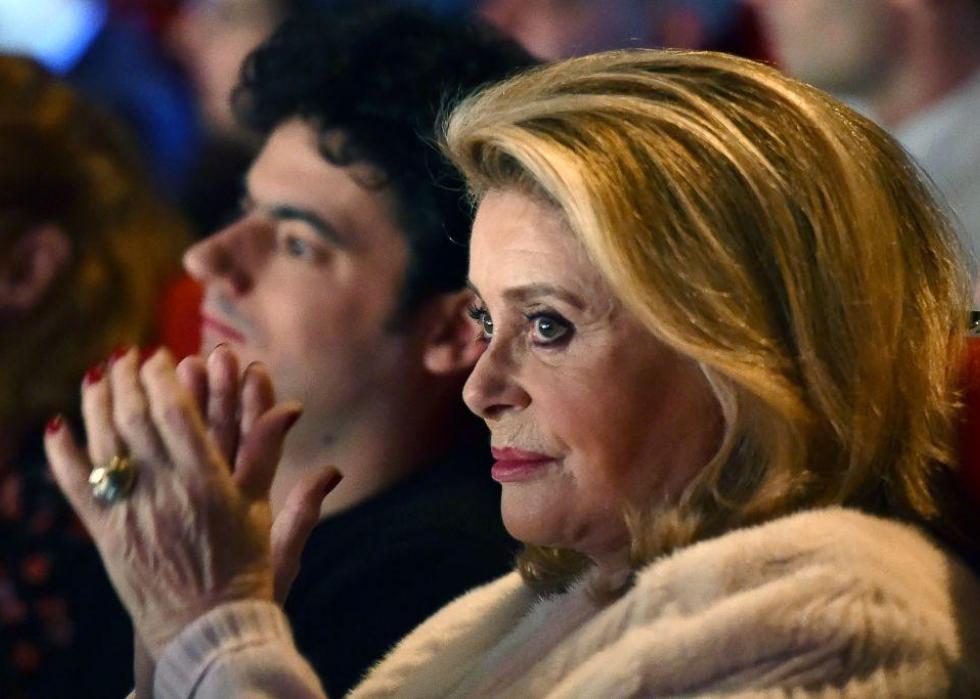
Catherine Deneuve
French actress Catherine Deneuve received criticism for naysaying the #MeToo movement, and apologized to victims of sexual assault earlier this year. She was 1 of 100 prominent French women who signed an open letter defending men's freedom to “hit on'” women.
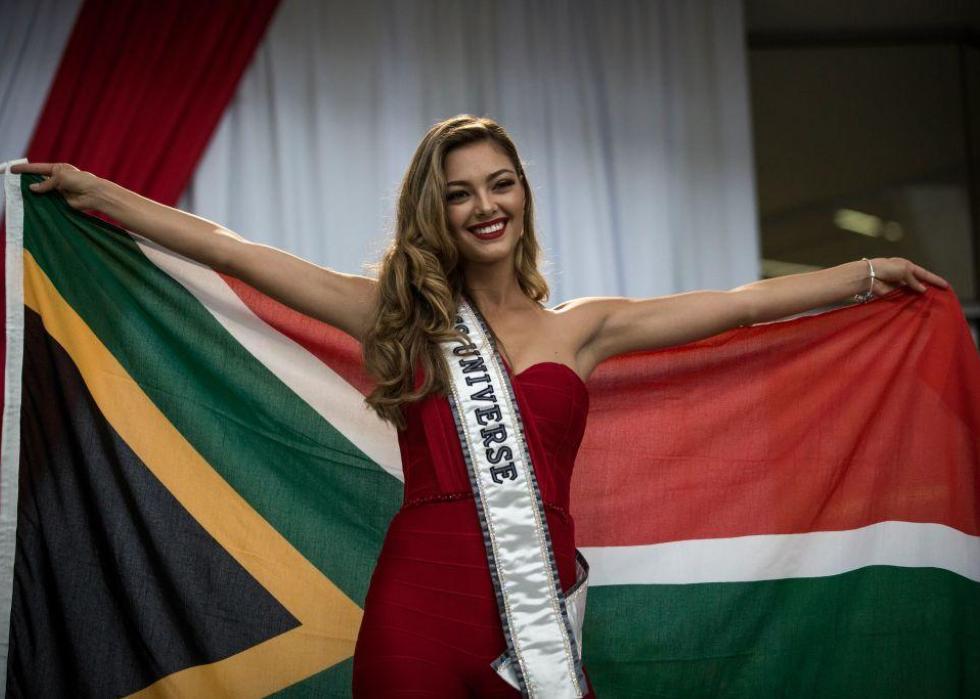
#Unbreakable
Miss Universe 2017 Demi-Leigh Nel-Peters posed with a South African flag at O.R. Tambo International Airport in Johannesburg after arriving home to South Africa for the first time after being crowned on Jan. 24, 2018. Nel-Peters used her platform to start the #Unbreakable campaign, which is aimed at training women to handle sexual harassment, assault, and other threatening situations.
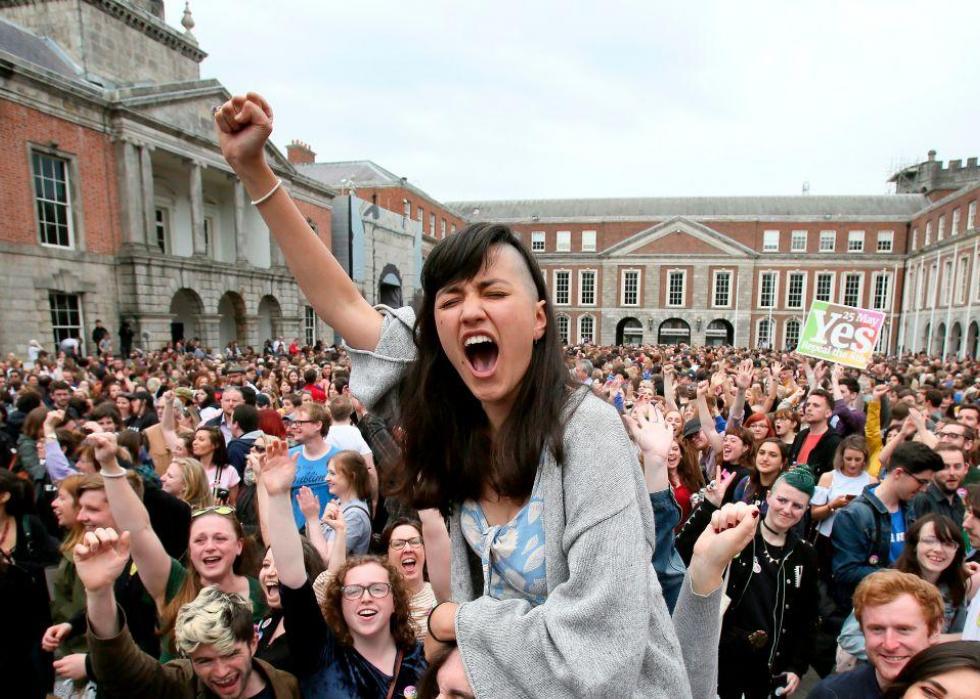
Abortion overturned in Ireland
Ireland voted by a landslide to ditch its strict abortion laws in a landmark referendum hailed by Prime Minister Leo Varadkar on Saturday as a “quiet revolution.” The ruling triggered scenes of jubilation in at Dublin Castle on May 26, 2018. Final results showed 66% of voters backed repealing the constitutional ban on terminations in what has traditionally been a staunchly Catholic country.
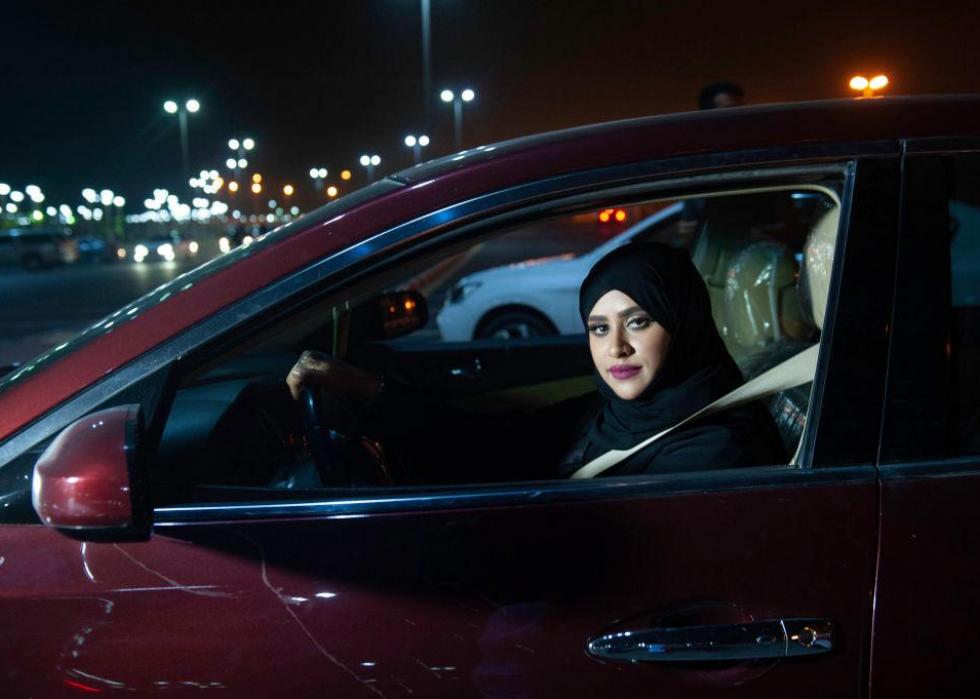
Women drive in Saudi Arabia
Saudi woman Sabika Habib drove her car through the streets of Khobar City on her way to the Kingdom of Bahrain a little after midnight on June 24, 2018, when Saudi Arabia ended the world's only ban on female motorists. The move, which follows a sweeping crackdown on female activists who long opposed the ban, is part of Crown Prince Mohammed bin Salman's wide-ranging reform drive to modernize the conservative nation.
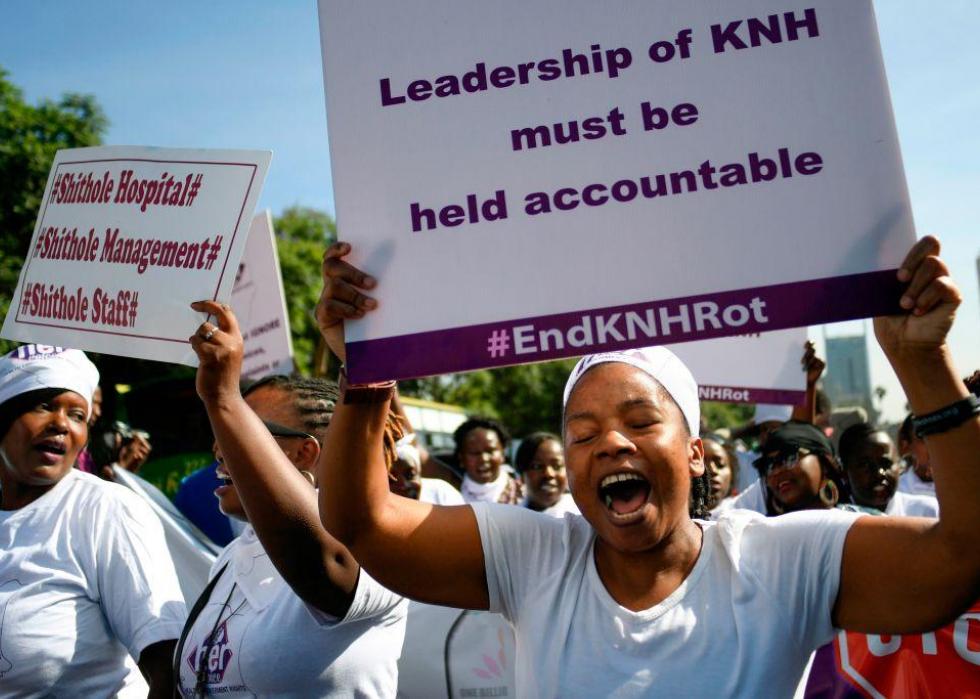
Activisits protest rape in Kenya
Kenyan women protested against the Kenyatta National Hospital in Nairobi on Jan. 23, 2018. Kenya’s health minister ordered an investigation into rape allegations that male staff members targeted women when they went to feed their babies.
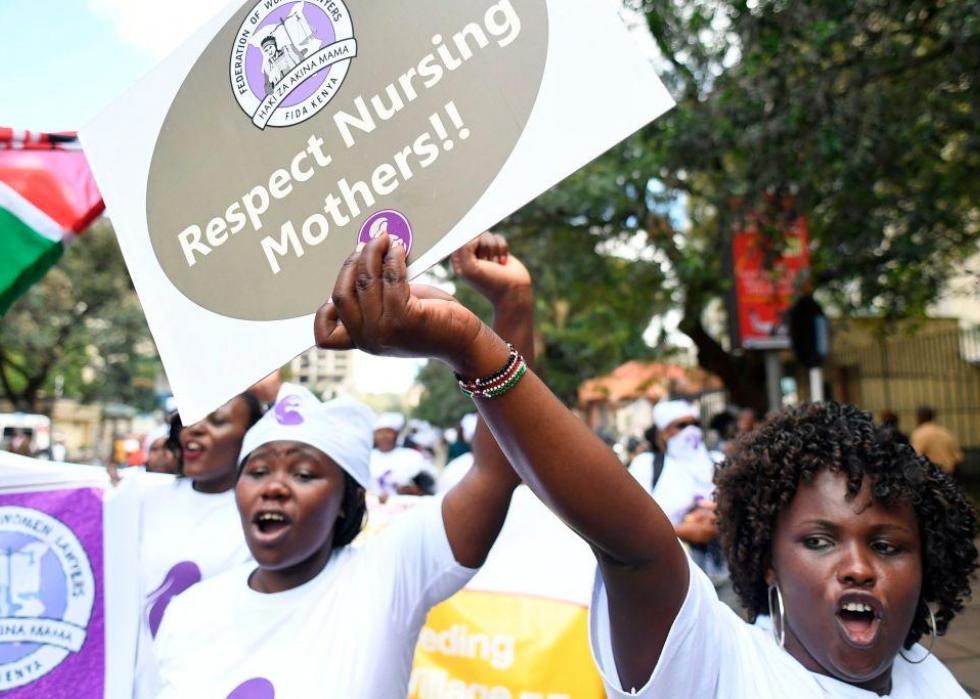
Breastfeeding support in Kenya
A group of protesters marched toward a restaurant after a female client was allegedly thrown out for breastfeeding and not covering up in Nairobi's Central Business District on May 15, 2018. The lady, identified as Betty Kim, took to social media after accusing the restaurant of discriminating against her.
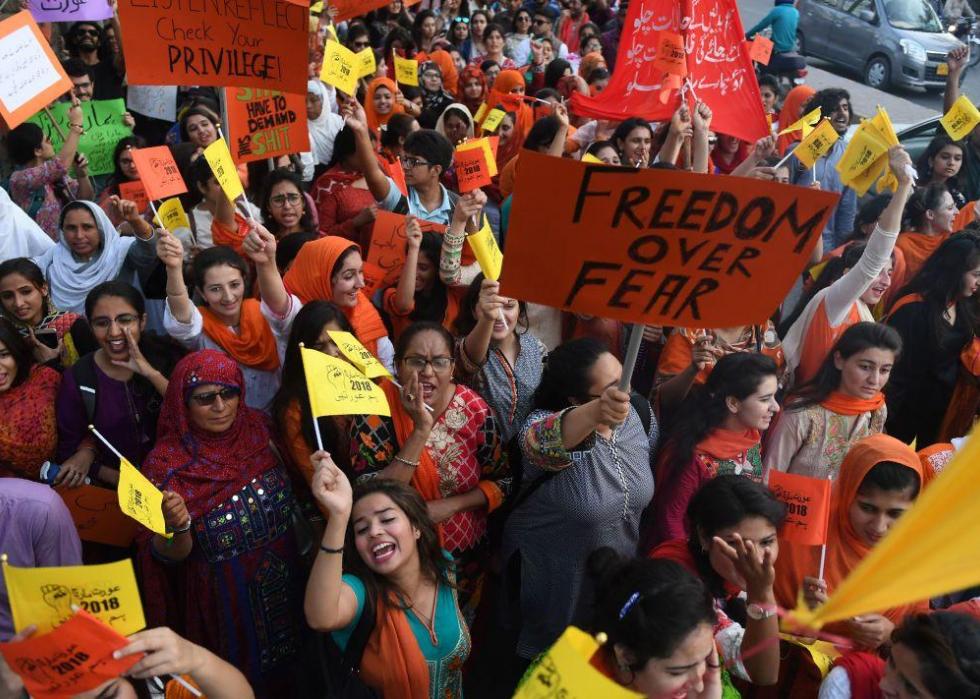
Women march in Pakistan
Pakistani activists carried placards as they marched during a rally to mark International Women's Day in Karachi on March 8, 2018. After the rape and murder of a 7-year-old girl in January, prominent Pakistani women spoke out about sexual assault in the country.
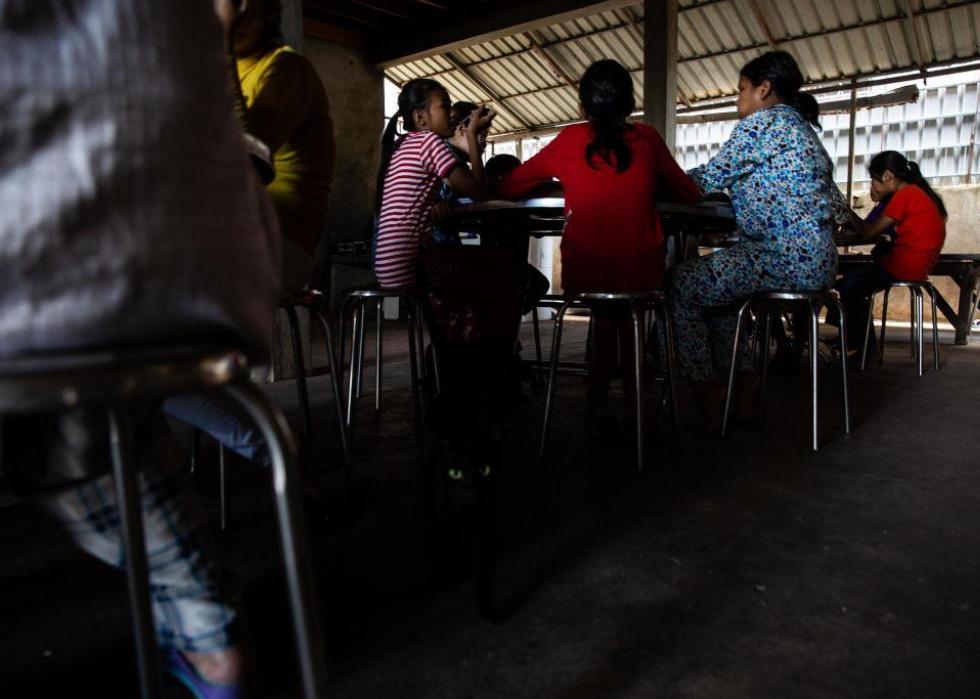
Women empowered in Cambodia
Women and their children had lunch at the Cambodian Women's Crisis Center shelter on July 2, 2018 in Phnom Penh, Cambodia. The shelter provides safe housing for victims of gender-based violence. While the #MeToo movement rises around the world, Cambodia continues to be a patriarchal society in which women are considered to be inferior to men. Activists and organizations aim to provide sexual health training for young women, empowering them through education, as well as factory jobs for those who are at risk of human trafficking.
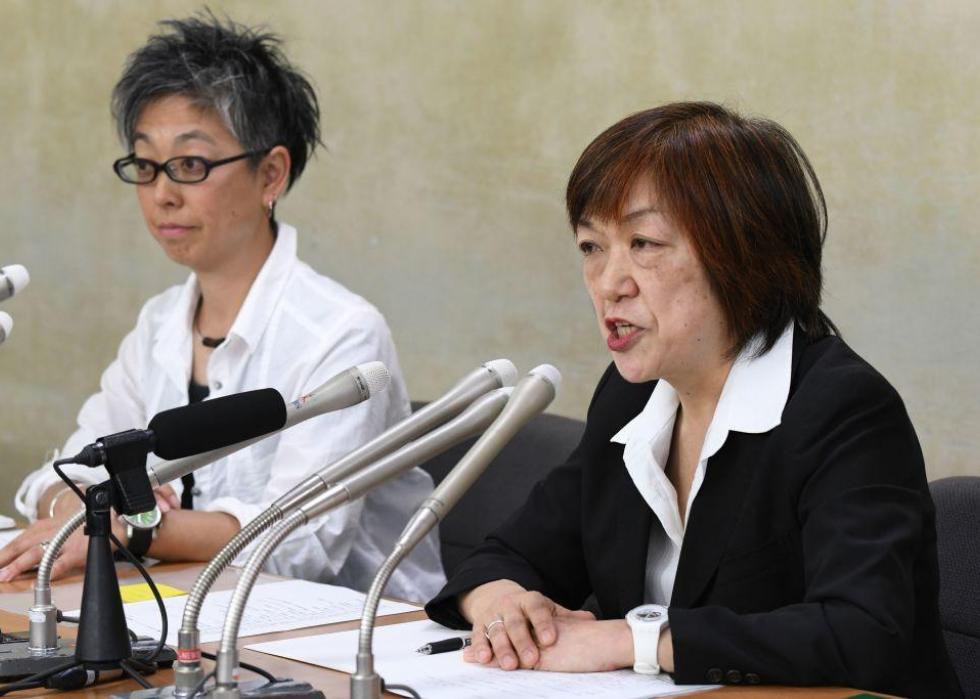
Japanese journalists speak out
Japanese journalist Yoshiko Hayashi, right, spoke on behalf of female journalists teaming up against widespread sexual harassment in Japanese media on May 15, 2018.
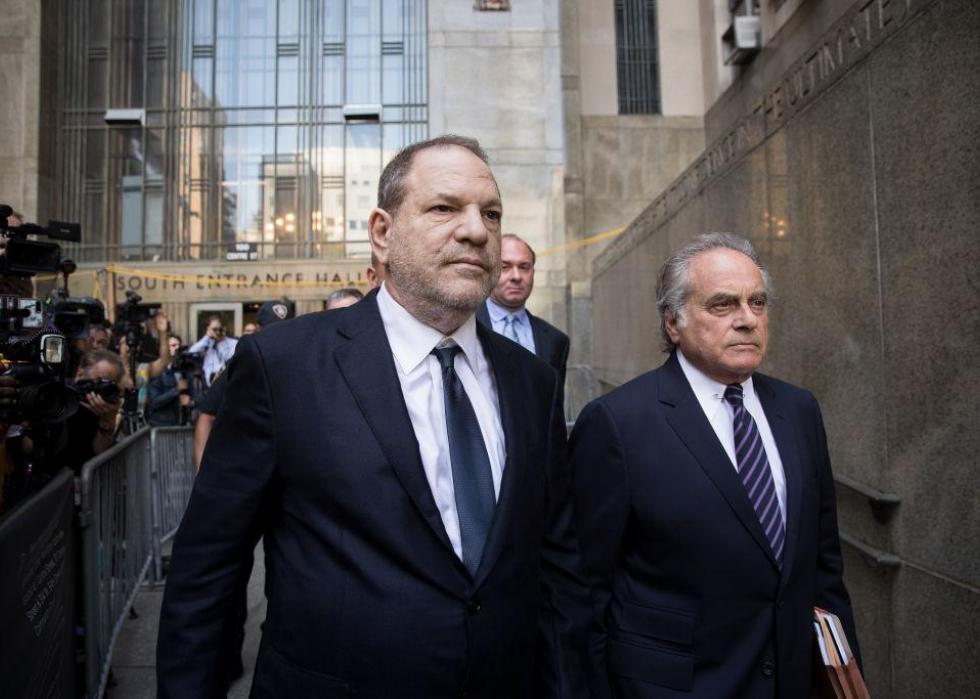
Harvey Weinstein charged
Harvey Weinstein and his attorney Benjamin Brafman exited the State Supreme Court, June 5, 2018 in New York City. Weinstein was charged with two counts of rape and one count of a criminal sexual act. He pleaded not guilty.



